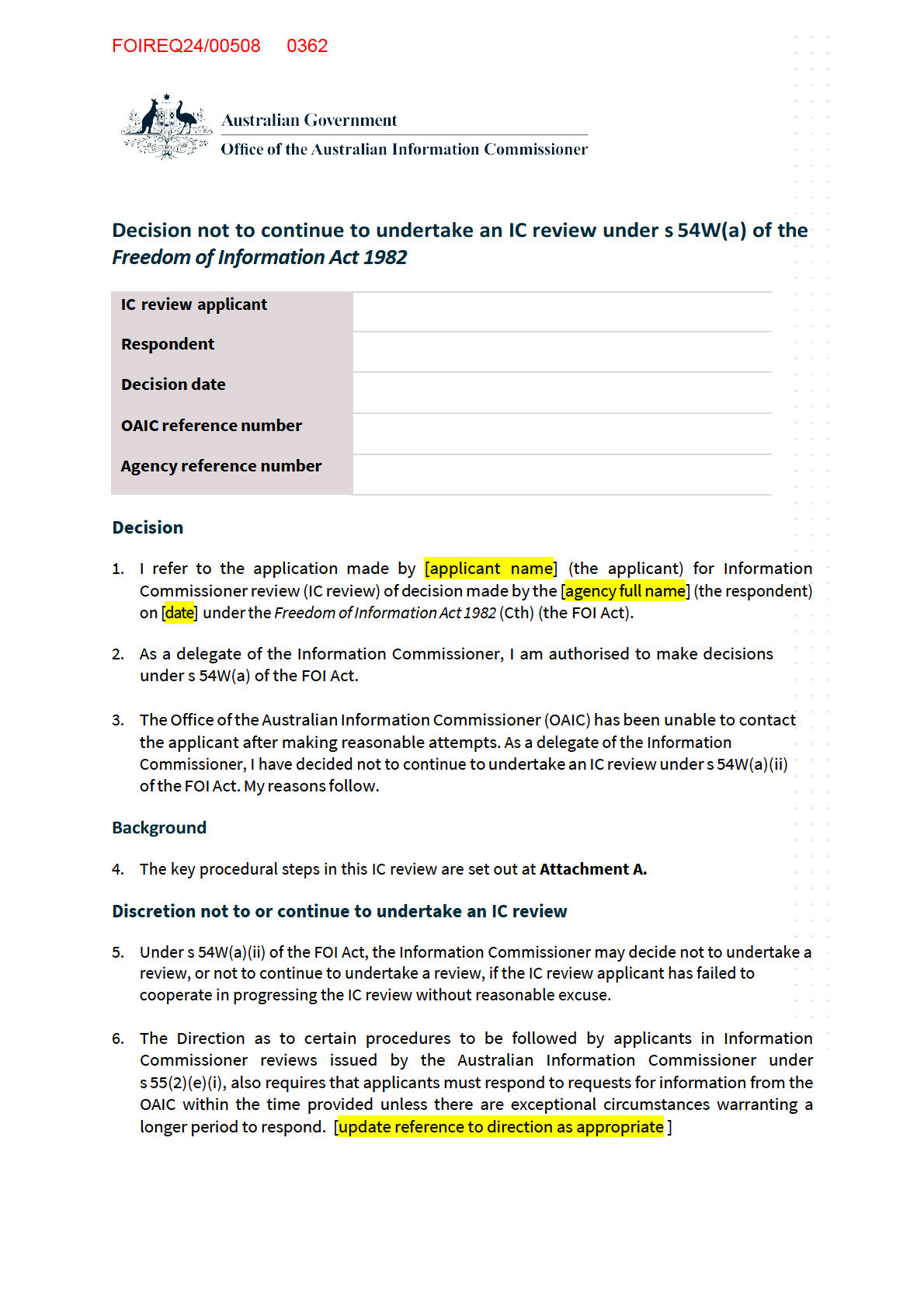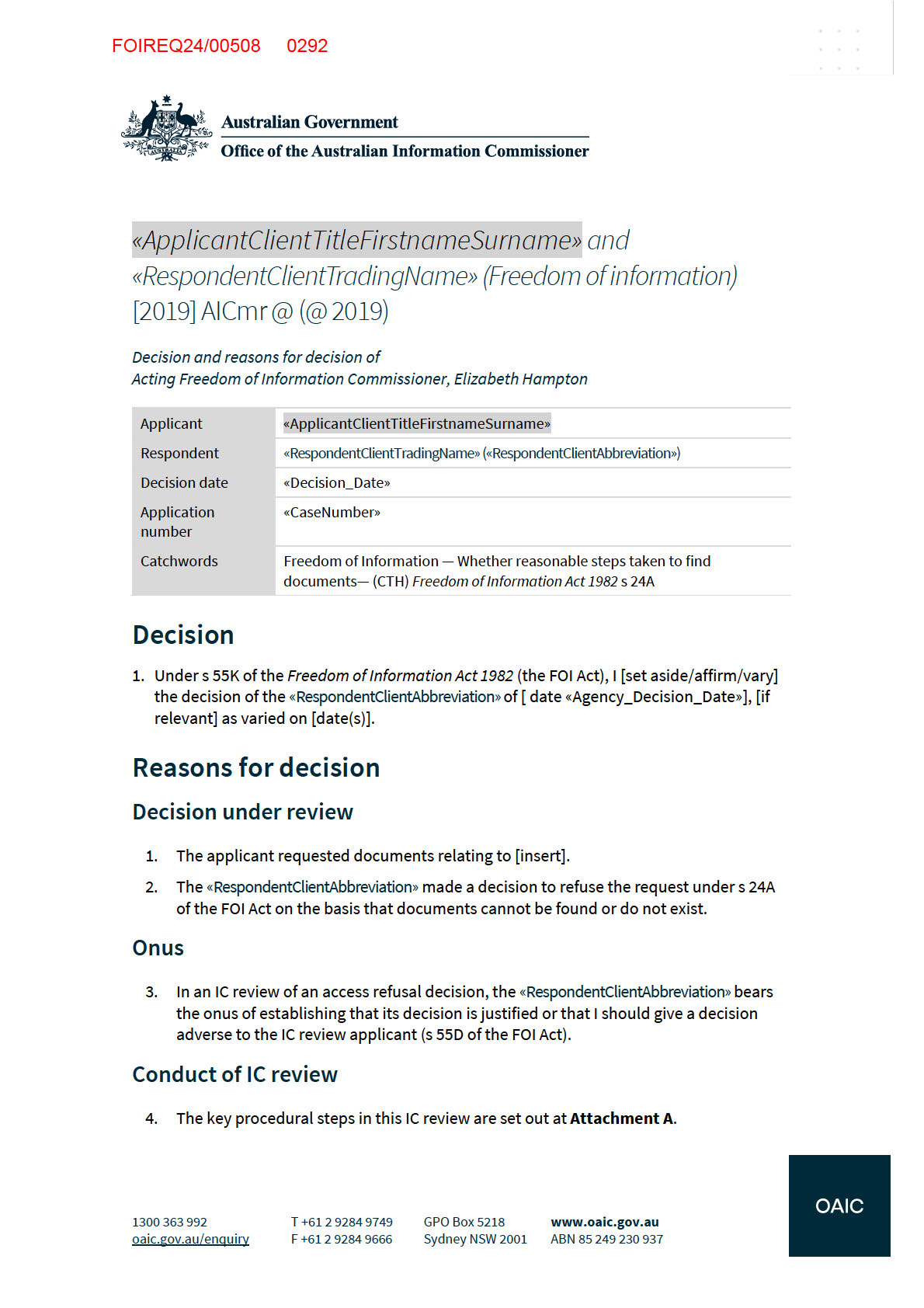
FOIREQ24/00508 0293
Issues to be decided
5. The issue be decided in this IC review is whether the «RespondentClientAbbreviation» has
taken all reasonable steps to find documents within the scope of the request (s 24A of
the FOI Act).
Material considered
6. The following material was considered in making this decision:
i. the «RespondentClientAbbreviation»’s decision and reasons for decision of [date
«Agency_Decision_Date»]
ii. [if relevant] the «RespondentClientAbbreviation»’s internal review decision and
reasons for decision of [date «Agency_Decision_Date»]
iii. [if relevant] the «RespondentClientAbbreviation»’s revised decision and reasons for
decision of [date «Agency_Decision_Date»]
iv. evidence of searches undertaken by the «RespondentClientAbbreviation»
v. the FOI Act, in particular s 24A
vi. the Guidelines issued by the Australian Information Commissioner under s 93A
of the FOI Act to which agencies must have regard in performing a function or
exercising a power under the FOI Act, in particular paragraphs [3.85] – [3.94]
vii. relevant case law, in particular
De Tarle and Australian Securities and
Investments Commission (Freedom of information) [2015] AATA 770, and
viii. the parties’ submissions.
Whether reasonable steps taken to find documents (s 24A)
Requirements
7. Section 24A requires that an agency take ‘all reasonable steps’ to find a requested
document before refusing access to it on the basis that it cannot be found or does not
exist.
8. The Guidelines issued under s 93A of the FOI Act explain:
The Act is silent on what constitutes ‘all reasonable steps’. The meaning of ‘reasonable’ in the
context of s 24A(1)(a) has been construed as not going beyond the limit assigned by reason,
not extravagant or excessive, moderate and of such an amount, size or number as is judged
to be appropriate or suitable to the circumstances or purpose.
Agencies and ministers should undertake a reasonable search on a flexible and common-
sense interpretation of the terms of the request. What constitutes a reasonable search will
depend on the circumstances of each request and will be influenced by the normal business
2
FOIREQ24/00508 0294
practices in the agency’s operating environment or the minister’s office. At a minimum, an
agency or minister should take comprehensive steps to locate documents, having regard to:
• the subject matter of the documents
• the current and past file management systems and the practice of destruction or
removal of documents, and
• the record management systems in place
• the individuals within an agency or minister’s office who may be able to assist with
the location of documents, and
• the age of the documents.1
«RespondentClientAbbreviation»’s decision
9. The «RespondentClientAbbreviation» found that documents falling with the scope of the
applicant’s request cannot be found or do not exist. In its reasons for decision, the
«RespondentClientAbbreviation» said:
…
Parties’ submissions
10. The applicant submitted:
11. The «RespondentClientAbbreviation» submitted:
Evidence of searches undertaken
12. The «RespondentClientAbbreviation» provided the OAIC with details of the searches
undertaken in relation to the FOI request and the outcome of those searches. I have
considered these records, which indicate that «RespondentClientAbbreviation»
undertook searches through:
1 Office of the Australian Information Commissioner,
Guidelines issued by the Australian Information
Commissioner under s 93A of the Freedom of Information Act (FOI Guidelines) [3.88] — [3.89]. For further
information, see [3.85] — [3.94];
‘RD’ and Comcare (Freedom of information) [2019] AICmr 61;
‘PK’ and
Department of the Prime Minister and Cabinet (Freedom of information) [2018] AICmr 65;
‘PI’ and
Department of Human Services (Freedom of information) [2018] AICmr 62;
‘PF’ and Department of Human
Services (Freedom of information) [2018] AICmr 59;
‘OP’ and Department of Home Affairs (Freedom of
information) [2018] AICmr 43;
Josh Taylor and Prime Minister of Australia (Freedom of information) [2018]
AICmr 42
3
FOIREQ24/00508 0295
• Case Management System
• Records Management System
• Electronic documents saved on computers, electronic devices such as iPads,
smartphones and apps (for example emails on Outlook, text messages etc)
• Electronic documents saved on portable media devices
• Hardcopy files stored in safes, compactus, tambours, desk drawers, etc
• If applicable, backup systems
• If applicable, consider whether the scope of the FOI requests requires an agency
to ask a contracted service provider to provide documents that were created by or
in the possession of the contractor or sub-contractor to an agency
13. I have also considered the records of the above searches undertaken by the agency,
which [«RespondentClientAbbreviation» also provided to the OAIC during the course of
this IC review] or [the «RespondentClientAbbreviation» detailed in its reasons for
decision], which identified:
• The date searches were undertaken
• The person/s who undertook the searches
• The locations searched
• The search terms used
• The outcomes of the searches undertaken
• If applicable, reasons as to why no documents have been found
• If searching an agency’s backup system is necessary, reasons as to why it would
be a substantial and unreasonable diversion of agency resources to search the
agency’s backup systems
• If applicable, the details of the contracted service providers in possession of
documents within the scope of the request
• Limitations of the search
Findings
14. Having regard to the scope of the applicant’s request, the parties’ submissions and the
«RespondentClientAbbreviation»’s evidence of searches, I am satisfied that the
«RespondentClientAbbreviation» has taken all reasonable steps to find documents within
the scope of the request as it was required to do by s 24A and that relevant
documents, if they existed, would have been found.
15. The documents sought by the applicant do not exist.
4
FOIREQ24/00508 0296
Elizabeth Hampton
Acting Freedom of Information Commissioner
[date]
5
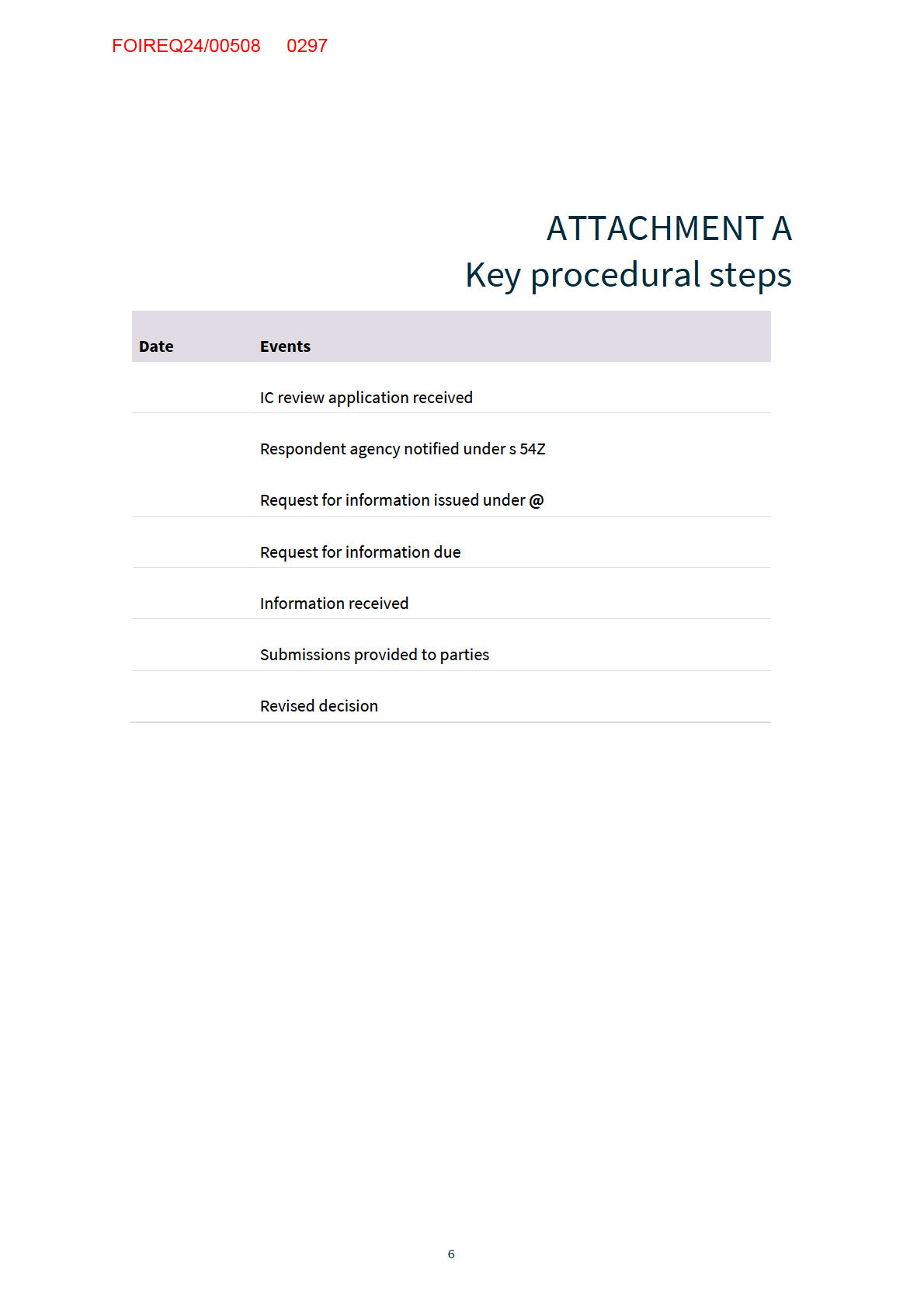
FOIREQ24/00508 0298
Review rights
Review by the Administrative Appeals Tribunal
If a party to an IC review is unsatisfied with an IC review decision, they may apply under s 57A of the
FOI Act to have the decision reviewed by the Administrative Appeals Tribunal (AAT). The AAT provides
independent merits review of administrative decisions and has power to set aside, vary, or affirm an IC
review decision.
An application to the AAT must be made within 28 days of the day on which the applicant is given the
IC review decision (s 29(2) of the
Administrative Appeals Tribunal Act 1975). An application fee may be
payable when lodging an application for review to the AAT. Further information is available on the
AAT's website (www.aat.gov.au) or by telephoning 1300 366 700.
Making a complaint to the Commonwealth Ombudsman
If you believe you have been treated unfairly by the OAIC, you can make a complaint to the
Commonwealth Ombudsman (the Ombudsman). The Ombudsman's services are free. The
Ombudsman can investigate complaints about the administrative actions of Australian Government
agencies to see if you have been treated unfairly.
If the Ombudsman finds your complaint is justified, the Ombudsman can recommend that the OAIC
reconsider or change its action or decision or take any other action that the Ombudsman considers is
appropriate. You can contact the Ombudsman's office for more information on 1300 362 072 or visit
the Commonwealth Ombudsman’s website at http://www.ombudsman.gov.au.
Accessing your information
If you would like access to the information that we hold about you, please
contact xxxxx@xxxx.xxx.xx. More information is available on the
Access our information page on
our website.
7
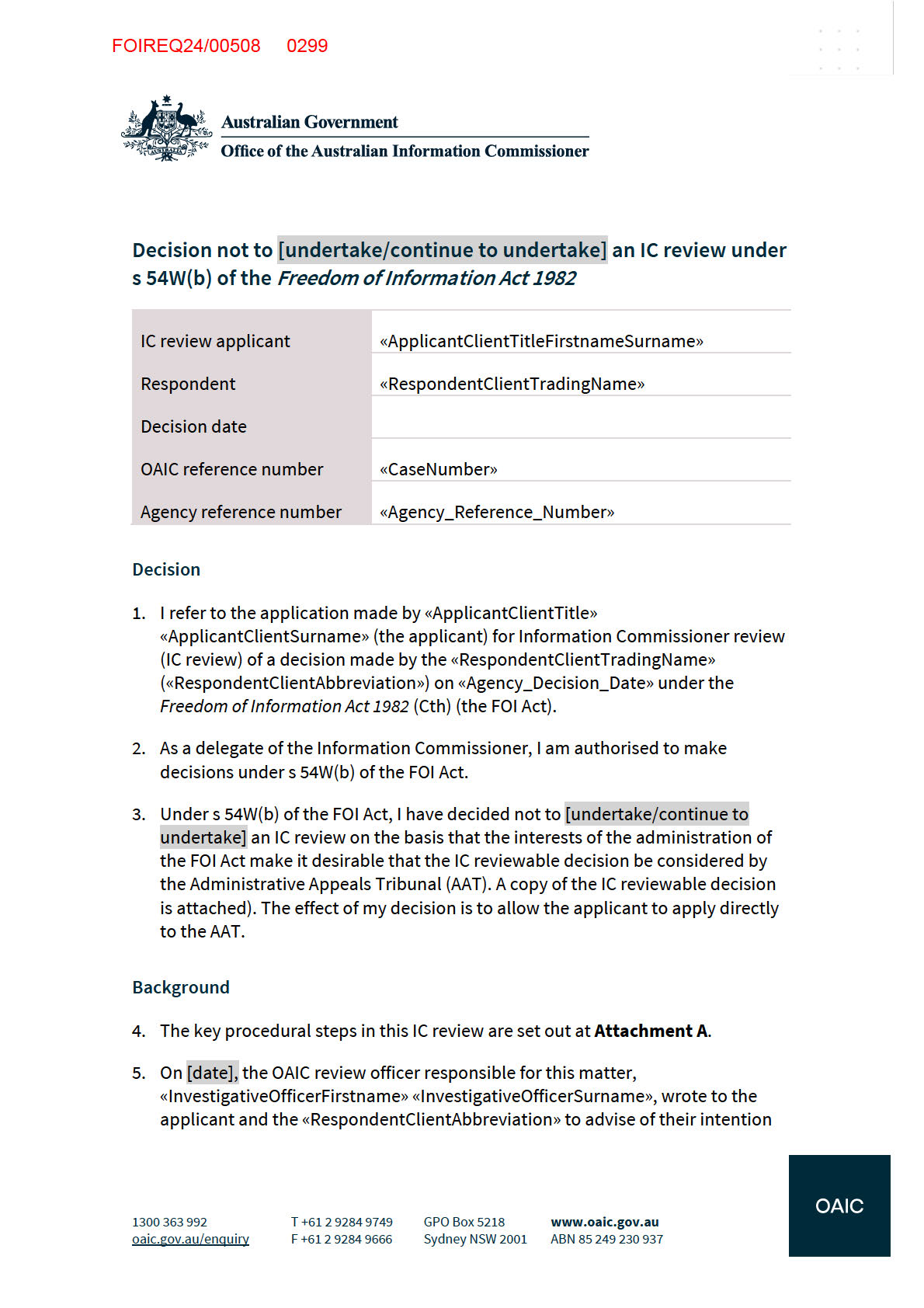
FOIREQ24/00508 0300
to recommend to the delegate of the Information Commissioner that this
application for IC review be finalised under s 54W(b) of the FOI Act on the basis
that it is in the interests of the administration of the FOI Act that the IC
reviewable decision be considered by the AAT.
6. «InvestigativeOfficerFirstname» «InvestigativeOfficerSurname» invited the
parties to provide reasons if they disagreed with the proposed finalisation of this
IC review by [date].
7. [if relevant] Based on the information before me, the OAIC has not received a
response.
8. OR [insert details of response or that no response was received]
Discretion not to [undertake/continue to undertake] an IC review
9. Under s 54W(b) of the FOI Act, the Information Commissioner may decide not to
undertake a review, or not to continue to undertake a review, if the Information
Commissioner is satisfied that the interests of the administration of the FOI Act
make it desirable that the IC reviewable decision be considered by the AAT.
10. The effect of such a decision would be to finalise this IC review application and
allow the applicant to apply directly to the AAT. The applicant would then have
28 days to lodge an application with the AAT in accordance with ordinary AAT
processes. AAT filing fees may apply.1
11. The discretion in s 54W(b) of the FOI Act may be exercised where the Information
Commissioner is satisfied that the interests of the administration of the FOI Act
make it desirable that the IC reviewable decision be considered directly by the
AAT, rather than initially by the Information Commissioner.
12. The Explanatory Memorandum to the Freedom of Information Amendment
(Reform) Bill 2009 which created s 54W(b) states:
One of the reasons for retaining a right of review to the AAT is that, as an experienced review
body, the AAT can properly deal with highly contested applications. This provision enables
the Information Commissioner to decline to undertake a review if satisfied it would be more
appropriate and efficient for the application to be made directly to the AAT.
1 https://www.aat.gov.au/apply-for-a-review/freedom-of-information-foi/fees
2
FOIREQ24/00508 0301
13. This is also referred to in the Guidelines issued by the Australian Information
Commissioner under s 93A (FOI Guidelines) at [10.88] – [10.89], which state:
The Information Commissioner can decline to undertake a review if satisfied ‘that the
interests of the administration of the [FOI] Act make it desirable’ that the AAT consider the
review application (s 54W(b)). It is intended that the Commissioner will resolve most
applications. Circumstances in which the Commissioner may decide that it is desirable for the
AAT to consider a matter instead of the Commissioner continuing with the IC review include:
• where the IC review is linked to ongoing proceedings before the AAT or a court
• where there is an apparent inconsistency between earlier IC review decisions and AAT
decisions
• where, should the application progress to an IC review decision, the IC review decision is
likely to be taken on appeal to the AAT on a disputed issue of fact
• where the FOI request under review is of a level of complexity that would be more
appropriately handled through the procedures of the AAT
• where there may be a perceived or actual conflict of interest in the Commissioner
undertaking review, including where:
o the FOI request under review was made to, or decided by, the
Information Commissioner or their delegate
o the FOI request or material at issue relate to specific functions exercised
by the Information Commissioner under the Privacy Act
o the applicant has active matters in other forums, including the AAT or
Federal Court and the Information Commissioner is the respondent
• where consideration by the AAT would further the objects of the FOI Act, particularly in
relation to the performance and exercise of functions and powers given by the FOI Act to
facilitate and promote public access to information, promptly and at the lowest
reasonable cost (s 3(4)).
The OAIC wil consult the parties involved in a matter before making a decision under
s 54W(b) to conclude an IC review.
14. The circumstances in which the Information Commissioner may consider it
desirable that the AAT consider the IC review application, as outlined in the FOI
Guidelines above, are not exhaustive. There will be circumstances that are not
listed where the Information Commissioner may deem it desirable to refer the
matter to the AAT.
15. The objects of the FOI Act provide that functions and powers under the FOI Act
are to be performed and exercised, as far as possible, to facilitate and promote
public access to information, promptly and at the lowest reasonable cost.
16. Further, in accordance with these objects, paragraph [10.18] of the FOI
Guidelines provides that IC reviews are intended to be a simple, practical and
cost-efficient method of external merits review.
3
FOIREQ24/00508 0302
Reasons for decision
17. [If relevant, set out parties’ submissions here and include consideration of these
submissions]
18. I have considered the issues in this matter and I am satisfied that it is in the
interests of the administration of the FOI Act that the IC reviewable decision be
considered by the AAT because:
• [review and update as appropriate]
• the IC review is linked to ongoing proceedings in the AAT or a court
• there is an apparent inconsistency between earlier IC review decisions and
AAT decisions
• the exemptions applied to the documents under s [x] of the FOI Act in this
IC review are highly contested and there are a number of affected third
parties who must be given a reasonable opportunity to present their case
before a final decision is made (s 55(4)(b))
• the IC review decision is likely to be taken on appeal to the AAT on a
disputed issue of fact
• the FOI request under review is complex or voluminous, resolving the IC
review matter would require a substantial allocation of OAIC resources,
and the matter could more appropriately be handled through the
procedures of the AAT
• the OAIC is the primary decision-maker of the decision under review
• the material at issue relates to specific functions exercised by the
Commissioner under the Privacy Act.
[Sample reasons]
•
It is linked to ongoing proceedings currently before the Administrative
Appeals Tribunal. It is clear from the applicant’s submissions in this IC review
that the applicant is seeking access to information about [provide details of
proceedings].
•
The FOI request under review is complex and voluminous and resolving this
matter would require substantial allocation of OAIC resources. For example,
the scope of this IC review extends to various exemptions including ss 22, 24A,
33, 42 and 47F of the FOI Act and requires consideration of 200 documents at
issue.
4
FOIREQ24/00508 0303
•
The exemption of s 33 of the FOI Act adds complexity to this matter because
before the Information Commissioner can determine that a document is not
an exempt document under s 33 of the FOI Act, she must first request the
Inspector-General of Intel igence to appear and give evidence on the
damage that would, or could reasonably be expected to be caused to the
security or the Commonwealth, the defence of the Commonwealth or the
international relations of the Commonwealth if access to the document were
given in accordance with the request (s 55ZB of the FOI Act), and
•
Further, in circumstances where there is a distinct possibility that, should the
IC review continue, any IC review decision will be taken on appeal by either
party to the AAT, I consider that it is desirable for the efficient administration
of the FOI Act that the IC reviewable decision is reviewed by the AAT at first
instance. I also consider that such an approach is consistent with the objects
of the FOI Act.
19. In deciding whether to exercise the discretion not to [undertake / continue to
undertake] a review, I have considered:
• [review and update as appropriate]
• The Explanatory Memorandum to the Freedom of Information Amendment
(Reform) Bill 2009 which created s 54W(b) states: One of the reasons for
retaining a right of review to the AAT is that, as an experienced review
body, the AAT can properly deal with highly contested applications. This
provision enables the Information Commissioner to decline to undertake a
review if satisfied it would be more appropriate and efficient for the
application to be made directly to the AAT.
• The objects of the FOI Act provide that functions and powers under the FOI
Act are to be performed and exercised, as far as possible, to facilitate and
promote public access to information, promptly and at the lowest
reasonable cost.
• In accordance with the objects of the FOI Act, paragraph [10.18] of the FOI
Guidelines provides that IC reviews are intended to be a simple, practical
and cost efficient method of external merit review.
• [Where the OAIC is the primary decision maker] The perceived conflict of
interest in the Information Commissioner reviewing a decision made by
their own agency.
20. For these reasons, as a delegate of the Information Commissioner, I have
decided to exercise my discretion to decide not to [undertake / continue to
5
FOIREQ24/00508 0304
undertake] an IC review under s 54W(b) of the FOI Act. I confirm that this IC
review is now closed.
Next steps
21. The applicant now has 28 calendar days from the date of this notice to make an
application for review of the IC reviewable decision to the AAT in accordance
with s 57A of the FOI Act.
22. If either party disagrees with my decision under s 54W(b) of the FOI Act,
information about your review rights is set out below.
Yours sincerely
[Director Name]
[Director]
Freedom of information Branch
4 November 2024
6
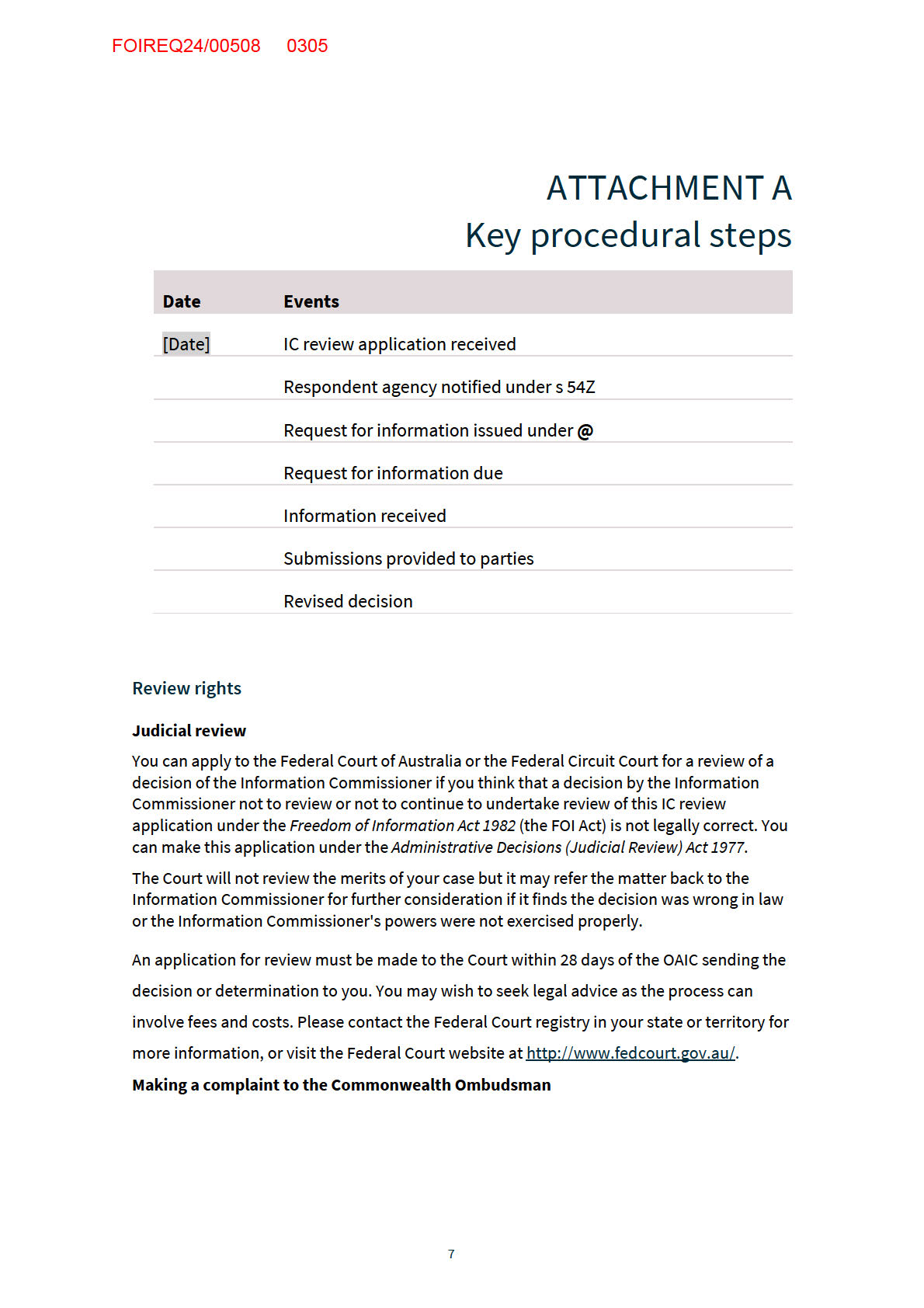
FOIREQ24/00508 0306
If you believe you have been treated unfairly by the OAIC, you can make a complaint to the
Commonwealth Ombudsman (the Ombudsman). The Ombudsman's services are free. The
Ombudsman can investigate complaints about the administrative actions of Australian
Government agencies to see if you have been treated unfairly.
If the Ombudsman finds your complaint is justified, the Ombudsman can
recommend that the OAIC reconsider or change its action or decision or take any
other action that the Ombudsman considers is appropriate. You can contact the
Ombudsman's office for more information on 1300 362 072 or visit the
Commonwealth Ombudsman’s website at http://www.ombudsman.gov.au.
Accessing your information
If you would like access to the information that we hold about you, please contact
xxxxx@xxxx.xxx.xx. More information is available on the
Access our
information2 page on our website.
2 www.oaic.gov.au/about-us/access-our-information/.
8

FOIREQ24/00508 0307
Notice to provide an adequate statement of reasons under
s 55E(2) of the Freedom of Information Act 1982
Section 55(E) of the
Freedom of Information Act 1982 (FOI Act) provides that the Information
Commissioner may require an agency or Minister to provide an adequate statement of reasons
as mentioned in subsection 26(1) of the FOI Act.
As such, I require you to:
• Provide an adequate statement of reasons under s 26(1) in response to the applicant’s FOI
request that address the searches undertaken to find relevant documents in accordance
with s 24A, as relevant to this IC review.
• Provide the OAIC, and the applicant, with a copy of the statement of reasons by
15 business
days].
Delivery of the response should be made via email to xxxxx@xxxx.xxx.xx.
Notice issued by [name of EL1 delegate], Assistant Director, Freedom of Information
Branch
Signed:
4 November 2024

FOIREQ24/00508 0308
Notice to conduct further searches under s 55V of the Freedom of
Information Act 1982
Under s 55V(2) I, [name of delegate], [role title], delegate of the Australian Information
Commissioner for the purposes of the
Freedom of Information Act 1982 (Cth) (FOI Act), require the
[agency or minister] to:
• Conduct further searches for documents relevant to the scope of the applicant’s FOI
request [
if relevant: In particular, documents relating to [update as appropriate]].
• Provide the OAIC with evidence of the further searches conducted and the outcomes
of those searches
• Complete and return the searches checklist included below at
Annexure 1.
Direction issued by [name of EL1 delegate], Assistant Director, Freedom of Information
Branch
Signed:
Date:
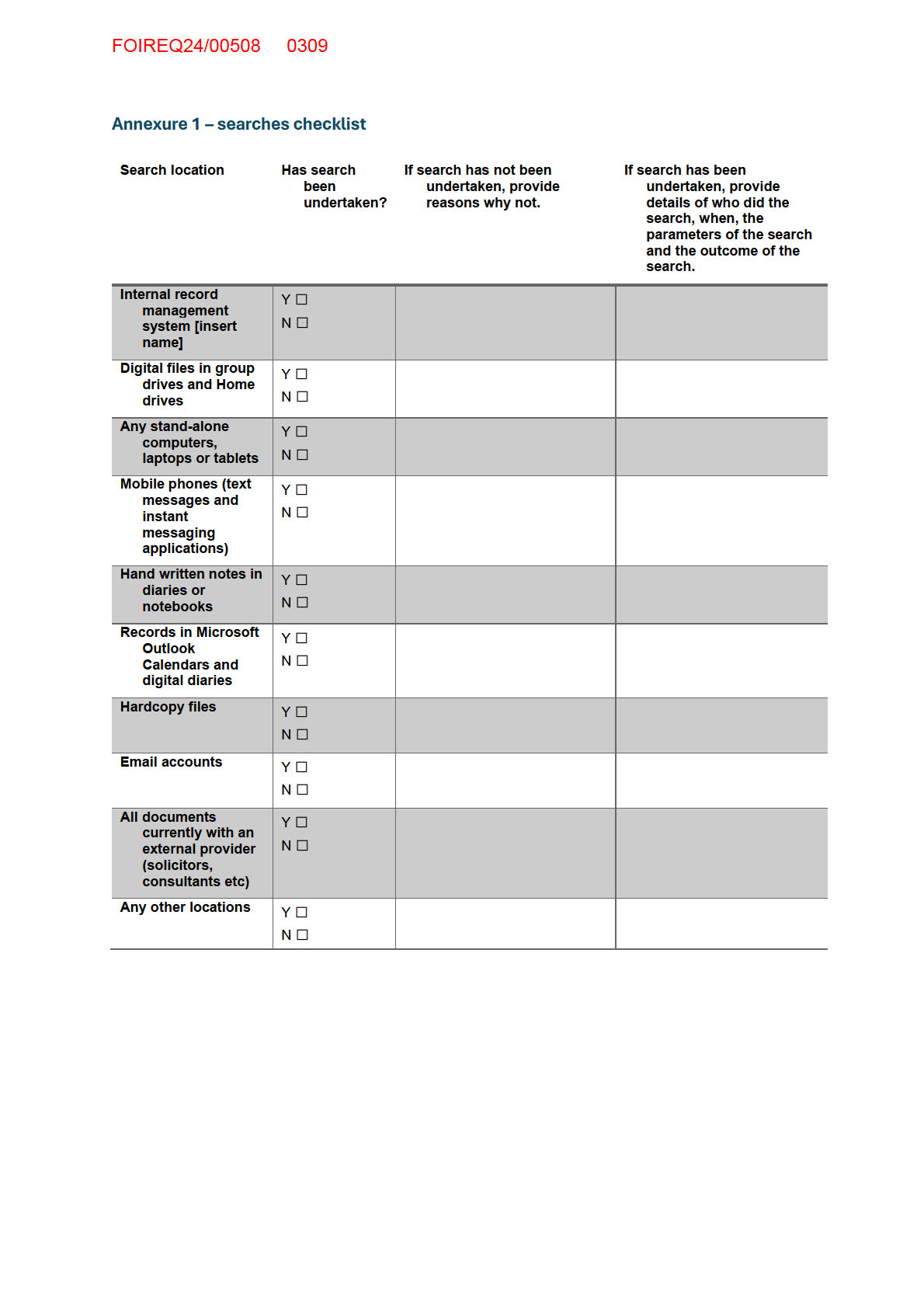
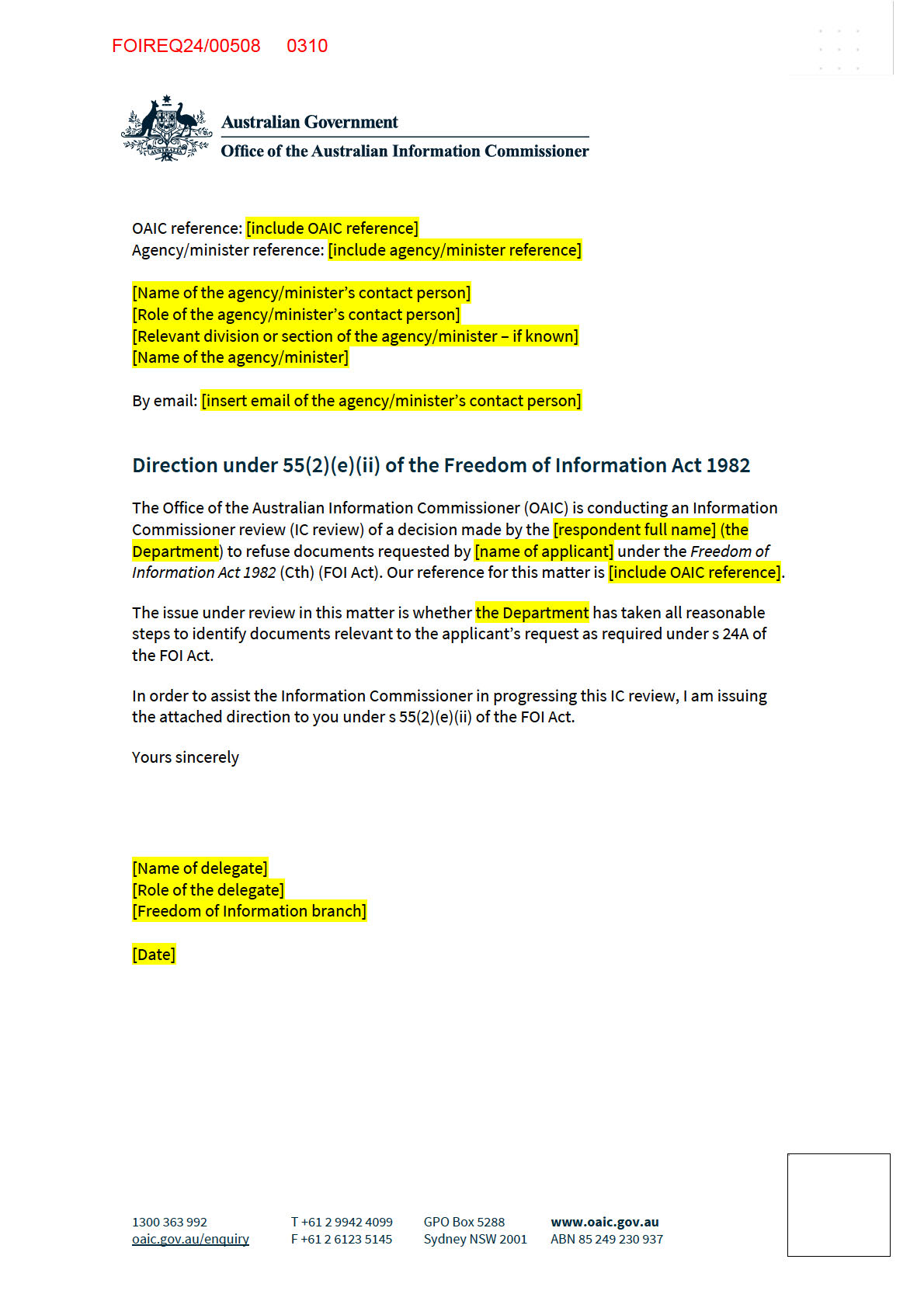

FOIREQ24/00508 0311
Notice to produce documents and give information
Under s 55(2)(e)(ii) of the FOI Act, I, [name of the delegate], delegate of the Australian
Information Commissioner, require the [name of the agency/minister] to produce to me the
following information and documents:
• a copy of any document that records searches conducted and the results of the searches,
including, for example:
− correspondence between the FOI decision maker and individuals who conducted
searches
− details of the line areas and staff who conducted searches
− notes kept by individuals conducting searches including details of all electronic
and archival locations that were searched (for example, databases, filing
cabinets), date range, terms used for conducting the searches, and
− any other records of searches or recorded consideration of where to search and
the results of the searches
• submissions relevant to whether the searches undertaken amounted to ‘all reasonable
steps’1 including, for example, an explanation of:
− where relevant documents would be located based on terms of the FOI request
and current and past file management systems, and
− locations that were searched including case management systems, emails,
databases such as TRIM, locations for storage of hardcopy documents or files
such as safes, locations for storage of specific kinds of documents such as
Ministerial or Departmental briefs
1 The term’ all reasonable steps’ in the context of s 24A is addressed in Part 3 of the FOI Guidelines at [3.85]-
[3.94].
2
FOIREQ24/00508 0312
• any other relevant information or submission the [agency/minister] may wish to make.
[Agency/Minister]
can comply with this notice by forwarding the information and documents
to xxxxx@xxxx.xxx.xx by
[10 business days].
I draw your attention to the following matters:
Freedom of Information Act 1982
Section 55(2)(e)(ii) of the FOI Act provides that the Information Commissioner may give
written directions as to the procedure to be followed in relation to a particular IC review.
Compliance with this direction can be met by taking the steps set out above.
FOI Guidelines and procedure direction
The Information Commissioner has issued guidelines under s 93A of the FOI Act that
Australian Government agencies and Ministers must have regard to when performing
a function or exercising a power under the FOI Act. For information about the IC review
process, see Part 10 of the FOI Guidelines.
The ‘Direction as to certain procedures to be followed in IC reviews’ applies to agencies and
Ministers during IC reviews and sets out the procedures that agencies and ministers must
follow in respect of the production of documents, the provision of a statement of reasons
where access has been deemed to be refused and the provision of submissions.
The IC Review Procedure Direction also explains that as the model litigant obligation under
the Legal Services Directions 2017 extends to Commonwealth entities involved in merits
review proceedings, failure to adhere to the requirements of the IC Review Procedure
Direction may amount to non-compliance with the model litigant obligation.
Direction issued by
[name of delegate],
[position title], Freedom of Information
Signed:
Date:
3
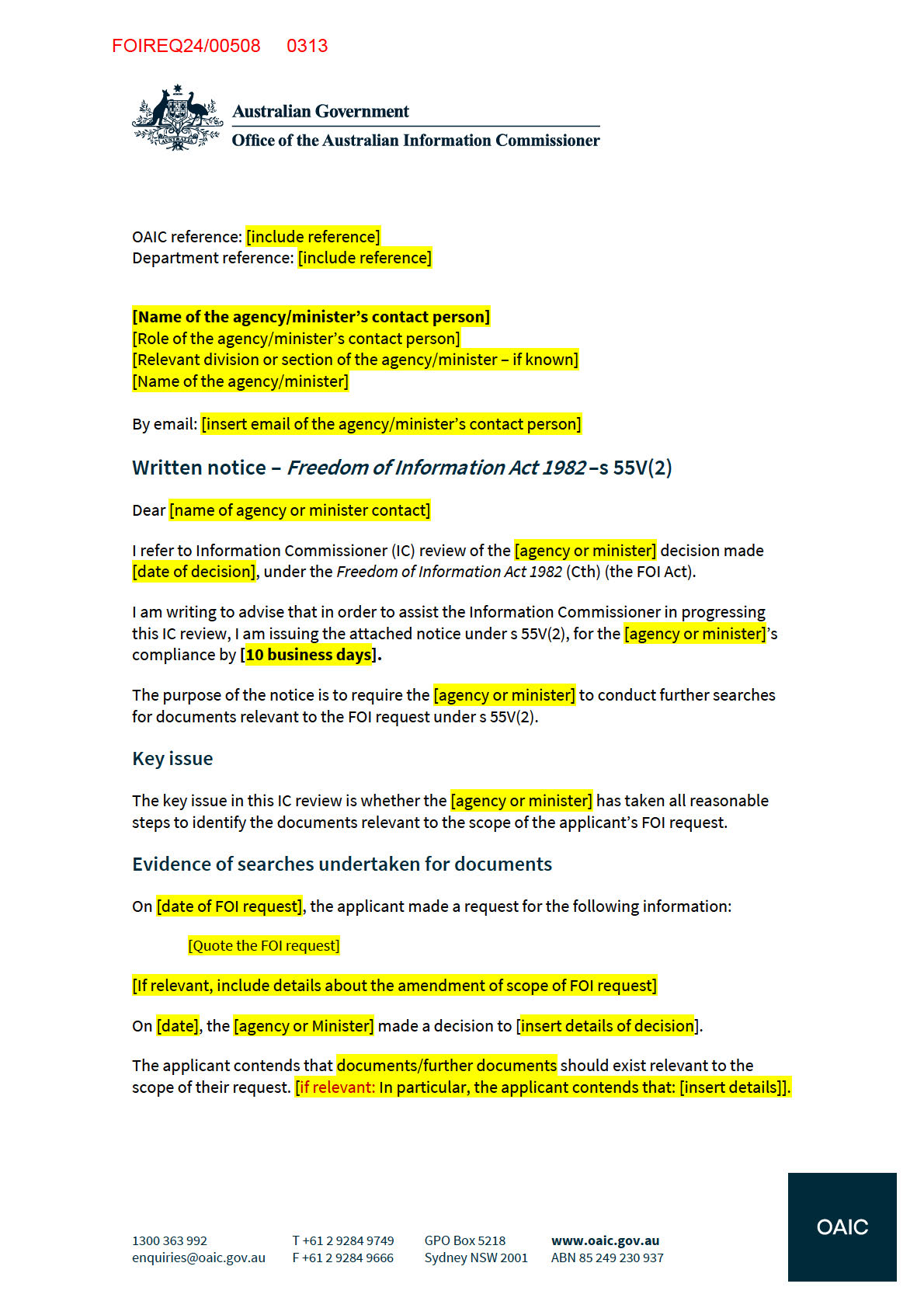
FOIREQ24/00508 0314
In an IC review of an access refusal decision, the [agency or minister] bears the onus of
establishing that their decision is justified or that I should give a decision adverse to the IC
review applicant (s 55D(1)).
Section 24A of the FOI Act requires that an agency take ‘all reasonable steps’ to find a
requested document before refusing access to it on the basis that it cannot be found or does
not exist.
Based on the [agency or minister’s] decision, I am not satisfied that the [agency or minister]
has demonstrated that it has taken all reasonable steps to find the requested document[s]
and that the document[s] cannot be found or does not exist/ no further documents can be
found.
This is because: [provide reasons as to why the OAIC is not satisfied that the agency/minister
has complied with s 24A,]
For example:
The scope of the applicant’s request appears to have been misinterpreted
It is not evident that any steps have been taken to search for relevant documents
It appears that relevant persons or relevant locations have not been searched [specify
details]
Accordingly, to assist the Information Commissioner in progressing this IC review, I am
issuing the attached notice under ss 55V(2) (
Attachment A), and a checklist to be completed
by the [agency or minister] in conducting further searches (
Attachment B).
Yours sincerely
[Name of delegate]
Director
Freedom of Information Branch
Office of the Australian Information Commissioner
[Date]
2

FOIREQ24/00508 0315
Attachment A
Notice to to conduct further searches under s 55V of the
Freedom of Information Act 1982
Under s 55V(2) I, [name of delegate], [role title], delegate of the Australian Information
Commissioner for the purposes of the
Freedom of Information Act 1982 (Cth) (FOI Act), require
the [agency or minister] to:
• Conduct further searches for documents relevant to the scope of the applicant’s
FOI request [
if relevant: In particular, documents relating to [update as
appropriate]].
• Provide the OAIC with evidence of the further searches conducted and the
outcomes of those searches
• Complete and return the searches checklist included below at
Attachment B.
Delivery of this response should be made by email to xxxxx@xxxx.xxx.xx,
by 10 business
days.
Notice issued by [name of delegate], [role title], Freedom of Information Branch
Signed:
[Date]
3
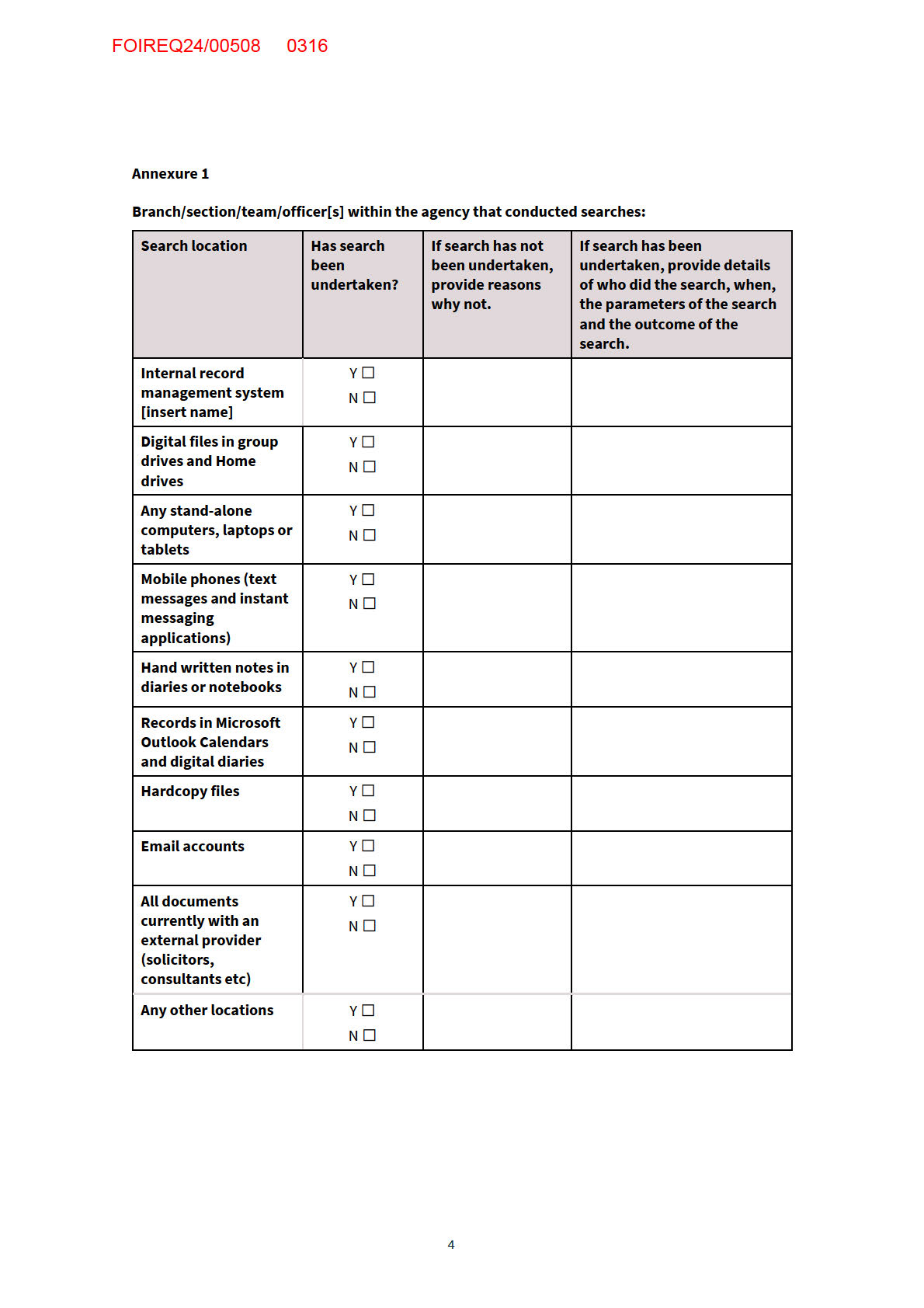
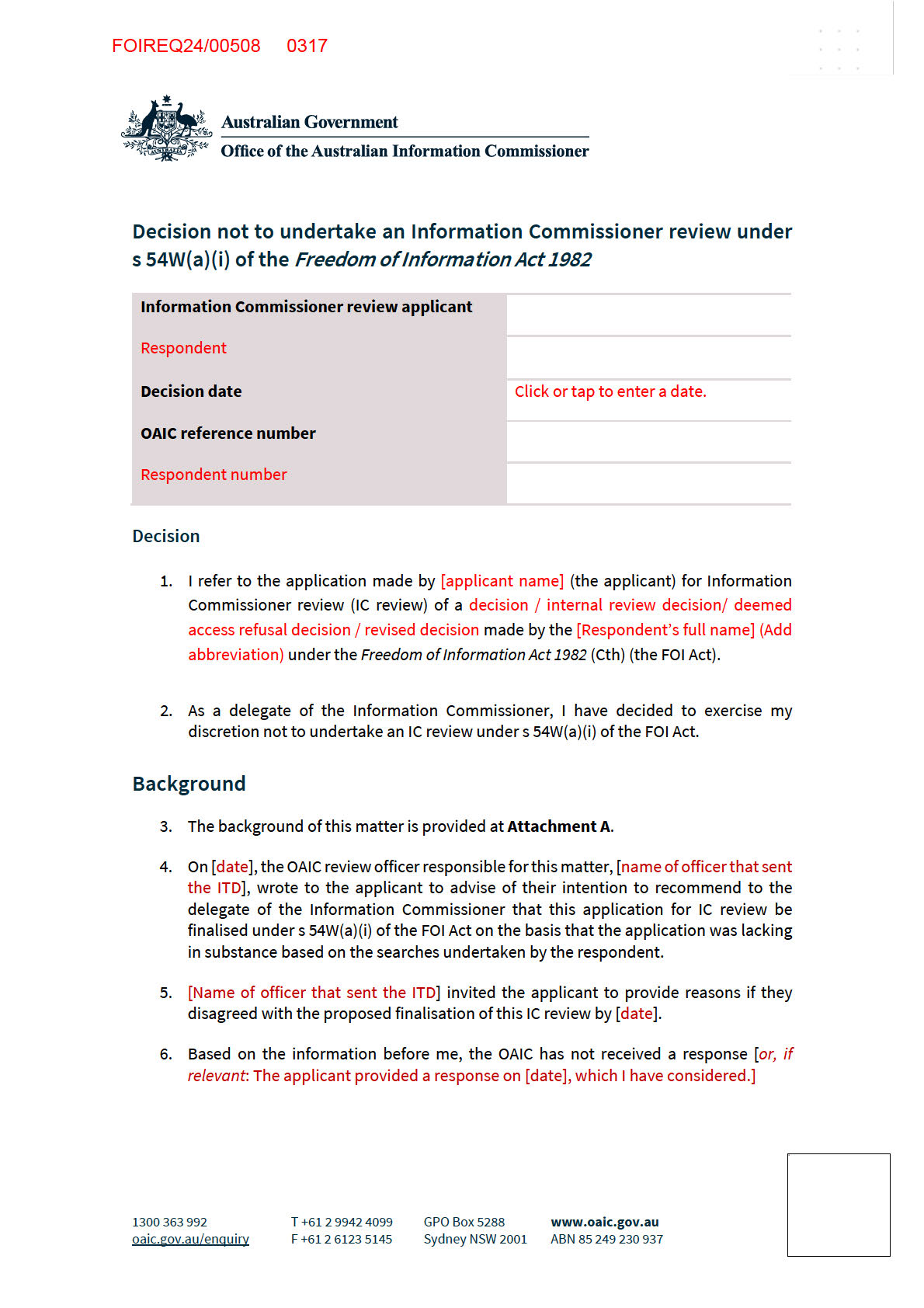
FOIREQ24/00508 0318
Consideration of whether reasonable steps undertaken
7. Section 24A requires that an agency take ‘all reasonable steps’ to find a requested
document before refusing access to it on the basis that it cannot be found or does not
exist.
8. The Guidelines issued under s 93A of the FOI Act explain:
The Act is silent on what constitutes ‘all reasonable steps’. The meaning of ‘reasonable’ in the
context of s 24A(1)(a) has been construed as not going beyond the limit assigned by reason,
not extravagant or excessive, moderate and of such an amount, size or number as is judged
to be appropriate or suitable to the circumstances or purpose.
Agencies and ministers should undertake a reasonable search on a flexible and common-
sense interpretation of the terms of the request. What constitutes a reasonable search will
depend on the circumstances of each request and will be influenced by the normal business
practices in the agency’s operating environment or the minister’s office. At a minimum, an
agency or minister should take comprehensive steps to locate documents, having regard to:
• the subject matter of the documents
• the current and past file management systems and the practice of destruction or
removal of documents, and
• the record management systems in place
• the individuals within an agency or minister’s office who may be able to assist with
the location of documents, and
• the age of the documents.1
9. In this context ‘reasonable’ has been understood as taking steps that are ‘not going
beyond the limit assigned by reason; not extravagant or excessive; moderate…Of such
an amount, size, number, etc., as is judged to be appropriate or suitable to the
circumstances or purpose’ (see De Tarle and Australian Securities and Investments
Commission (Freedom of Information) [2015] AATA 770 at [19]).
Agency decision
10. The [abbreviated name of the agency or the minister] found that documents falling
with the scope of the applicant’s request cannot be found or do not exist. In its reasons
1 Office of the Australian Information Commissioner,
Guidelines issued by the Australian Information
Commissioner under s 93A of the Freedom of Information Act (FOI Guidelines) [3.88] — [3.89]. For further
information, see [3.85] — [3.94];
‘RD’ and Comcare (Freedom of information) [2019] AICmr 61;
‘PK’ and
Department of the Prime Minister and Cabinet (Freedom of information) [2018] AICmr 65;
‘PI’ and
Department of Human Services (Freedom of information) [2018] AICmr 62;
‘PF’ and Department of Human
Services (Freedom of information) [2018] AICmr 59;
‘OP’ and Department of Home Affairs (Freedom of
information) [2018] AICmr 43;
Josh Taylor and Prime Minister of Australia (Freedom of information) [2018]
AICmr 42
2
FOIREQ24/00508 0319
for decision, the [abbreviated name of the agency or the minister] said:[summarise
what the agency or minister has submitted in its initial FOI decision]
Parties’ submissions
11. The applicant submitted:
[insert quote or summarise submission]
12. [Abbreviated name of the agency or the minister] submitted:
[insert quote or summarise submission]
Evidence of searches undertaken
13. [Abbreviated name of the agency or the minister] provided the OAIC with details of
the searches undertaken in relation to the FOI request and the outcome of those
searches. I have considered these records, which indicate that [abbreviated name of
the agency or the minister]undertook searches through:
[include and delete as appropriate]
• Case Management System
• Records Management System
• Electronic documents saved on computers, electronic devices such as iPads,
smartphones and apps (for example emails on Outlook, text messages etc)
• Electronic documents saved on portable media devices
• Hardcopy files stored in safes, compactus, tambours, desk drawers, etc
• If applicable, backup systems
• If applicable, consider whether the scope of the FOI requests requires an agency
to ask a contracted service provider to provide documents that were created by
or in the possession of the contractor or sub-contractor to an agency
14. I have also considered the records of the above searches undertaken by the agency,
which [abbreviated name of the agency or the minister] also provided to the OAIC
during the course of this IC review or [abbreviated name of the agency or the
minister]detailed in its reasons for decision, which identified:
• The date searches were undertaken
• The person/s who undertook the searches
• The locations searched
• The search terms used
• The outcomes of the searches undertaken
• If applicable, reasons as to why no documents have been found
3
FOIREQ24/00508 0320
• If searching an agency’s backup system is necessary, reasons as to why it would
be a substantial and unreasonable diversion of agency resources to search the
agency’s backup systems
• If applicable, the details of the contracted service providers in possession of
documents within the scope of the request
• Limitations of the search
Decision not to continue to undertake a review
15. I am a delegate of the Information Commissioner.
16. Under s 54W of the FOI Act, the Information Commissioner may decide not to
undertake a review, or not to continue to undertake a review, if the Information
Commissioner is satisfied that the IC review application is frivolous, vexatious,
misconceived, lacking in substance or not made in good faith.
17. I have had regard to the following:
i. the [abbreviated name of the agency or the minister]’s decision and reasons for
decision of [date of decision of FOI request]
ii. [if relevant] the [abbreviated name of the agency or the minister]’s internal
review decision and reasons for decision of [date of internal review decision]
iii. [if relevant] the
[abbreviated name of the agency or the minister]
’s revised
decision and reasons for decision of [date of revised decision]
iv. evidence of searches undertaken by the [abbreviated name of the agency or the
minister]
v. the FOI Act, in particular s 24A
vi. the Guidelines issued by the Australian Information Commissioner under s 93A
of the FOI Act to which agencies must have regard in performing a function or
exercising a power under the FOI Act, in particular paragraphs [3.85] – [3.94]
vii. relevant AAT decisions, in particular
De Tarle and Australian Securities and
Investments Commission (Freedom of information) [2015] AATA 770, and
viii. the parties’ submissions.
18. Having regard to the scope of the applicant’s request, the parties’ submissions and
[agency or the minster]’s evidence of searches, it appears that the [agency or the
minster] has taken all reasonable steps to find documents within the scope of the
request as it was required to do by s 24A and that relevant documents, if they
existed, would have been found.
19. On this basis, I am satisfied that the matter is [frivolous, vexatious, misconceived,
lacking in substance, or not made in good faith].
4
FOIREQ24/00508 0321
20. In deciding whether to exercise the discretion not to continue to undertake a review,
I have considered:
• Based on the information me, I consider that the [abbreviated name of the agency
or the minister] has discharged its onus of establishing that the decision is
justified
• The OAIC did not receive any submissions/response from the applicant
• Continuing to review this matter will not promote the objects of the FOI Act.
21. For these reasons, as a delegate of the Information Commissioner, I have decided to
exercise my discretion to decide not to continue to undertake a review of this
application under s 54W of the FOI Act. I confirm that this IC review is now closed.
Review rights are set out below.
Yours sincerely
[Delegate name]
Director
[Freedom of Information branch]
[Date]
5
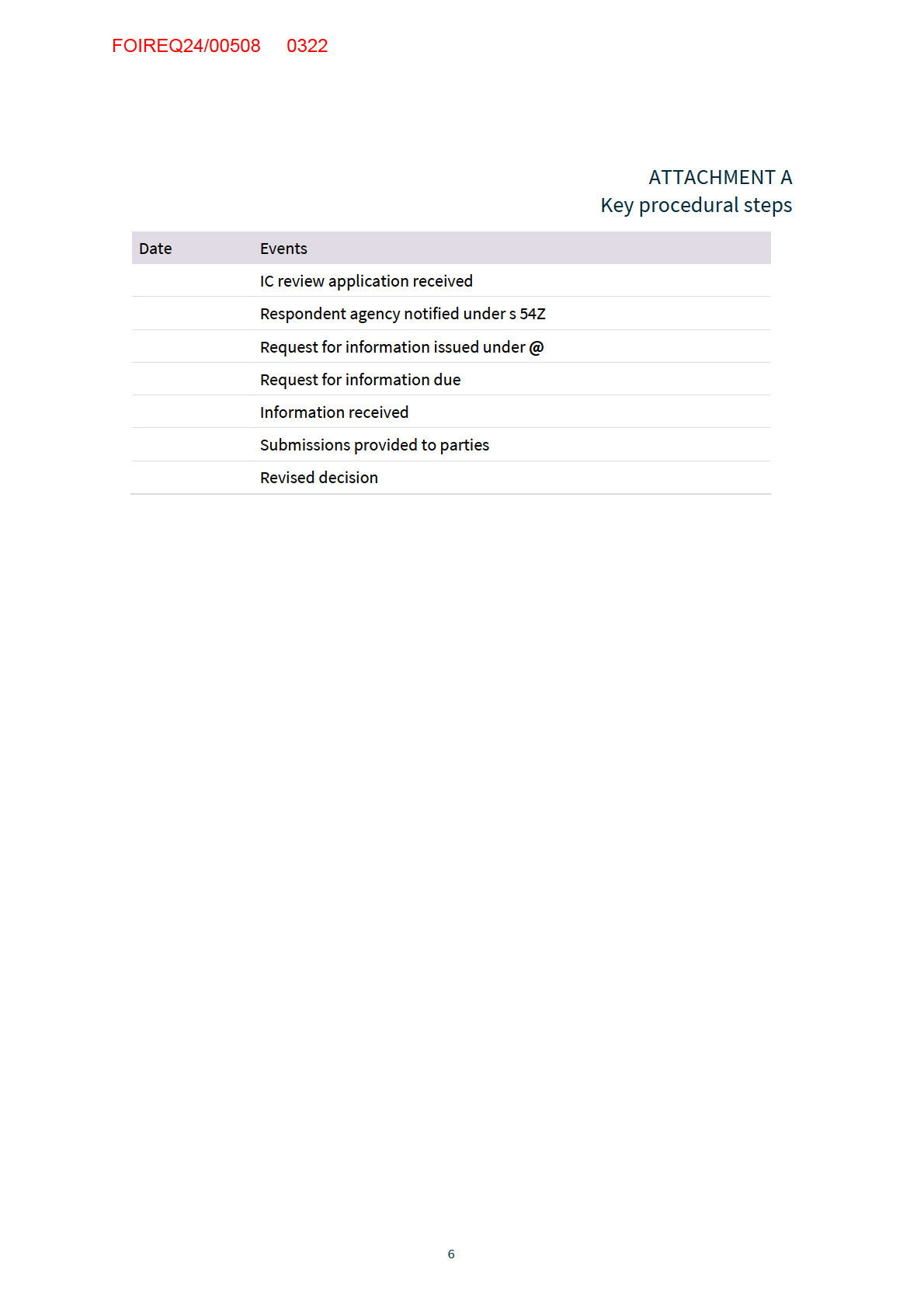
FOIREQ24/00508 0323
Review rights
Judicial review
You can apply to the Federal Court of Australia or the Federal Circuit Court for a review of a
decision of the Information Commissioner if you think that a decision by the Information
Commissioner not to review or not to continue to undertake review of your IC review
application under the
Freedom of Information Act 1982 (the FOI Act) is not legally correct. You
can make this application under the
Administrative Decisions (Judicial Review) Act 1977.
The Court wil not review the merits of your case but it may refer the matter back to the
Information Commissioner for further consideration if it finds the decision was wrong in law
or the Information Commissioner's powers were not exercised properly. An application for
review must be made to the Court within 28 days of the OAIC sending the decision or
determination to you. You may wish to seek legal advice as the process can involve fees and
costs. Please contact the Federal Court registry in your state or territory for more
information, or visit the Federal Court website at http://www.fedcourt.gov.au/.
Making a complaint to the Commonwealth Ombudsman
If you believe you have been treated unfairly by the OAIC, you can make a complaint to the
Commonwealth Ombudsman (the Ombudsman). The Ombudsman's services are free. The
Ombudsman can investigate complaints about the administrative actions of Australian
Government agencies to see if you have been treated unfairly.
If the Ombudsman finds your complaint is justified, the Ombudsman can recommend that
the OAIC reconsider or change its action or decision or take any other action that the
Ombudsman considers is appropriate. You can contact the Ombudsman's office for more
information on 1300 362 072 or visit the Commonwealth Ombudsman’s website at
http://www.ombudsman.gov.au.
Accessing your information
If you would like access to the information that we hold about you, please contact
xxxxx@xxxx.xxx.xx. More information is available on the
Access our information2 page on
our website.
7
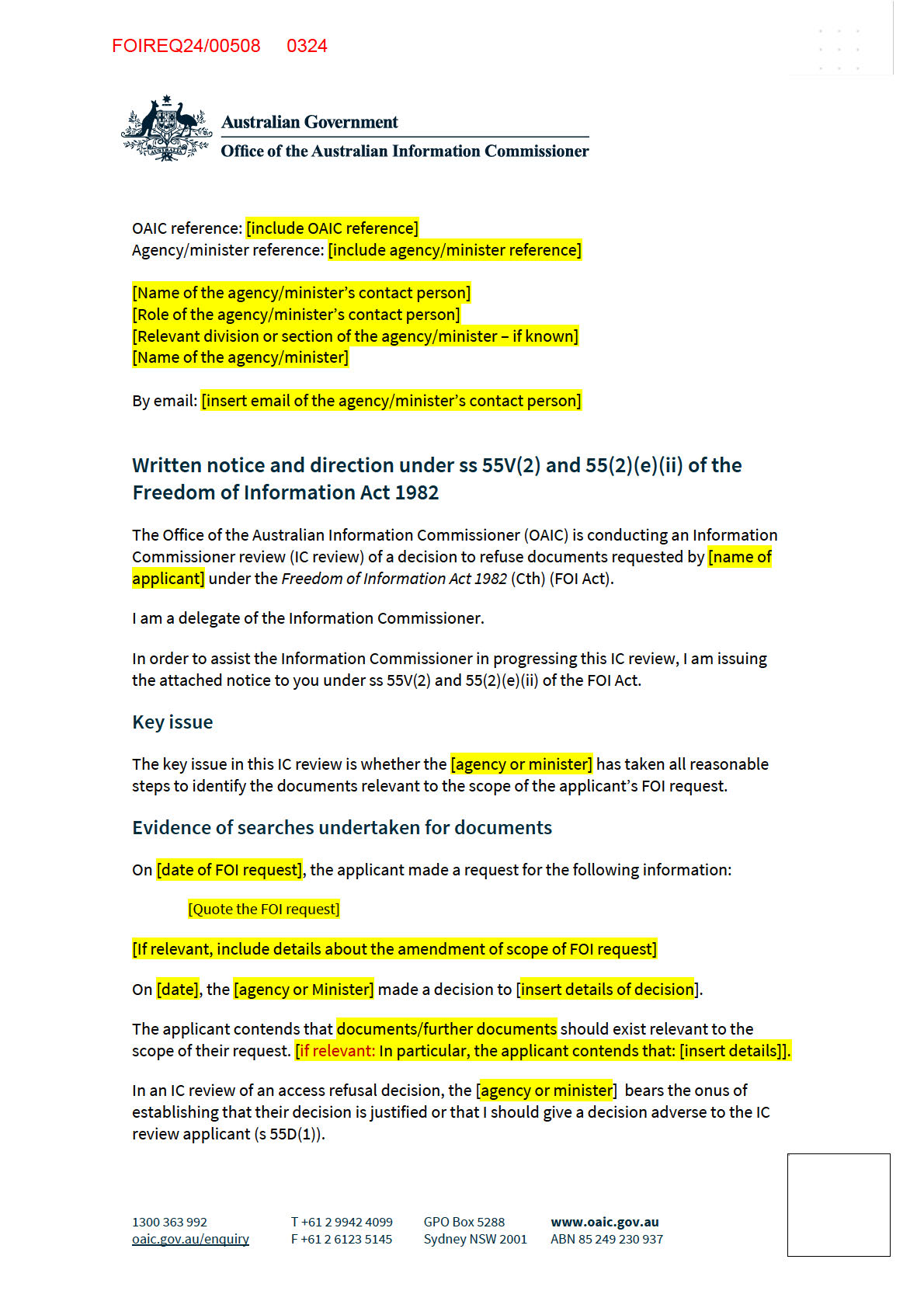
FOIREQ24/00508 0325
Section 24A of the FOI Act requires that an agency take ‘all reasonable steps’ to find a
requested document before refusing access to it on the basis that it cannot be found or does
not exist.
Preliminary view
Based on the [agency or minister’s] decision, I am not satisfied that the [agency or minister]
has demonstrated that it has taken all reasonable steps to find the requested document[s]
and that the document[s] cannot be found or does not exist/ no further documents can be
found.
This is because: [provide reasons as to why the OAIC is not satisfied that the agency/minister
has complied with s 24A]
For example:
The scope of the applicant’s request appears to have been misinterpreted
It is not evident that any steps have been taken to search for relevant documents
It appears that relevant persons or relevant locations have not been searched [specify
details]
Accordingly, to assist the Information Commissioner in progressing this IC review, I am
issuing the attached direction and notice under ss 55(2)(e) and 55V(2) (
Attachment A), and a
checklist to be completed by the [agency or minister] in conducting further searches
(
Attachment B).
Yours sincerely
[Name of delegate]
Director
Freedom of Information Branch
Office of the Australian Information Commissioner
[Date]
2

FOIREQ24/00508 0326
Attachment A
Notice to produce documents and give information
Under s 55(2)(e)(i ) of the FOI Act, I, [name of the delegate], delegate of the Australian
Information Commissioner, require the [name of the agency/minister] to produce to me the
following information and documents:
• a copy of any document that records searches conducted and the results of the
searches, including, for example:
− correspondence between the FOI decision maker and individuals who conducted
searches
− details of the line areas and staff who conducted searches
− notes kept by individuals conducting searches including details of all electronic
and archival locations that were searched (for example, databases, filing
cabinets), date range, terms used for conducting the searches, and
− any other records of searches or recorded consideration of where to search and
the results of the searches
• submissions relevant to whether the searches undertaken amounted to ‘all reasonable
steps’1 including, for example, an explanation of:
− where relevant documents would be located based on terms of the FOI request
and current and past file management systems, and
− locations that were searched including case management systems, emails,
databases such as TRIM, locations for storage of hardcopy documents or files
1 The term’ all reasonable steps’ in the context of s 24A is addressed in Part 3 of the FOI Guidelines at [3.85]-
[3.94].
3
FOIREQ24/00508 0327
such as safes, locations for storage of specific kinds of documents such as
Ministerial or Departmental briefs
• any other relevant information or submission the [agency/minister] may wish to
provide.
A response to this notice should be delivered via email to xxxxx@xxxx.xxx.xx by [
10
business days].
Direction issued by
[name of delegate],
[position title], Freedom of Information
Signed:
Date:
4

FOIREQ24/00508 0328
Notice to conduct further searches under s 55V of the
Freedom of Information Act 1982
Under s 55V(2) I, [name of delegate], [role title], delegate of the Australian Information
Commissioner for the purposes of the
Freedom of Information Act 1982 (Cth) (FOI Act), require
the [agency or minister] to:
• Conduct further searches for documents relevant to the scope of the applicant’s
FOI request [
if relevant: In particular, documents relating to [update as
appropriate]].
• Provide the OAIC with evidence of the further searches conducted and the
outcomes of those searches
• Complete and return the searches checklist included below at
Attachment B.
Delivery of this response should be made by email to xxxxx@xxxx.xxx.xx,
by 10 business
days.
Notice issued by [name of delegate], [role title], Freedom of Information Branch
Signed:
[Date]
5
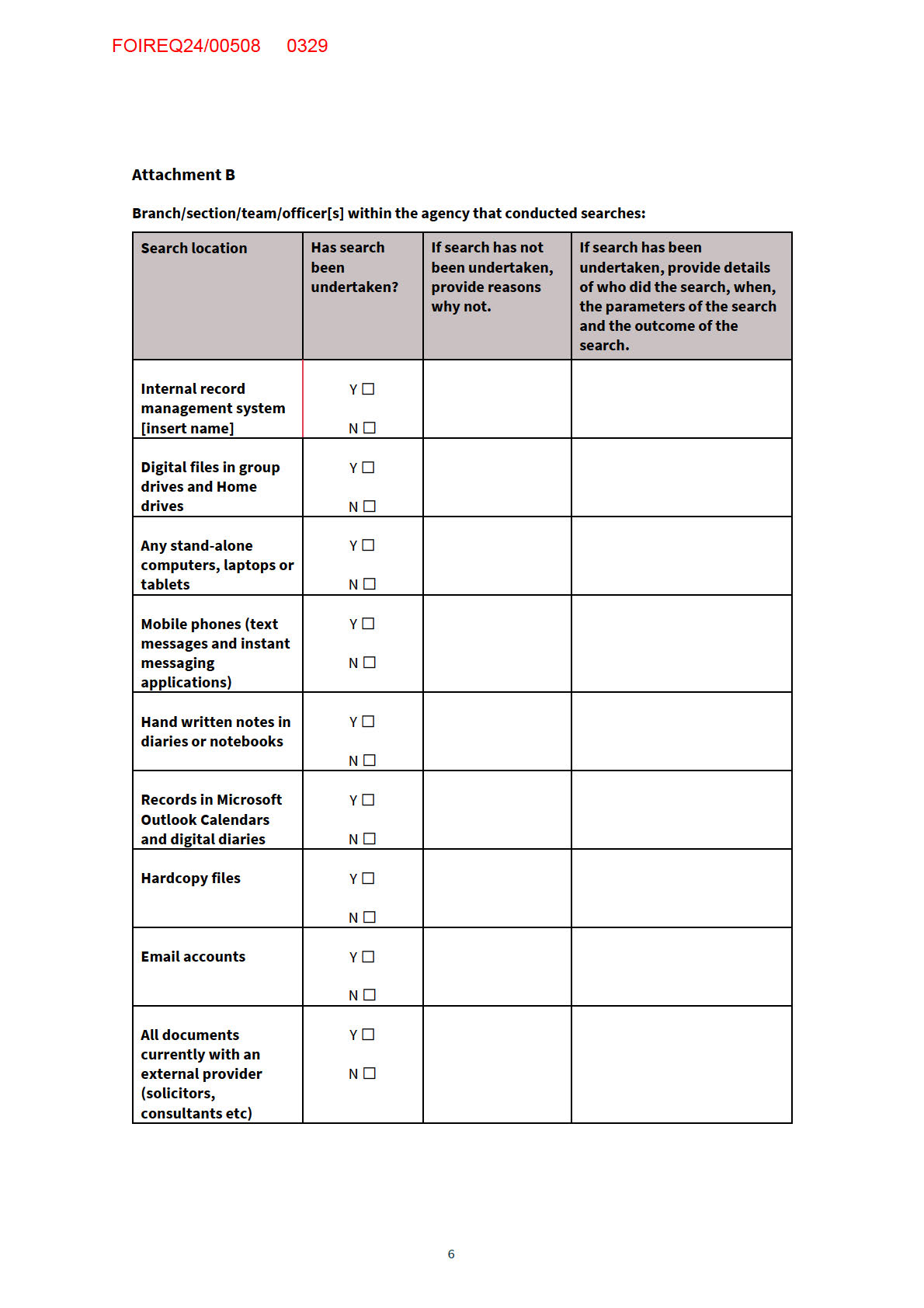
FOIREQ24/00508 0330
Any other locations
Y ☐
N ☐
7
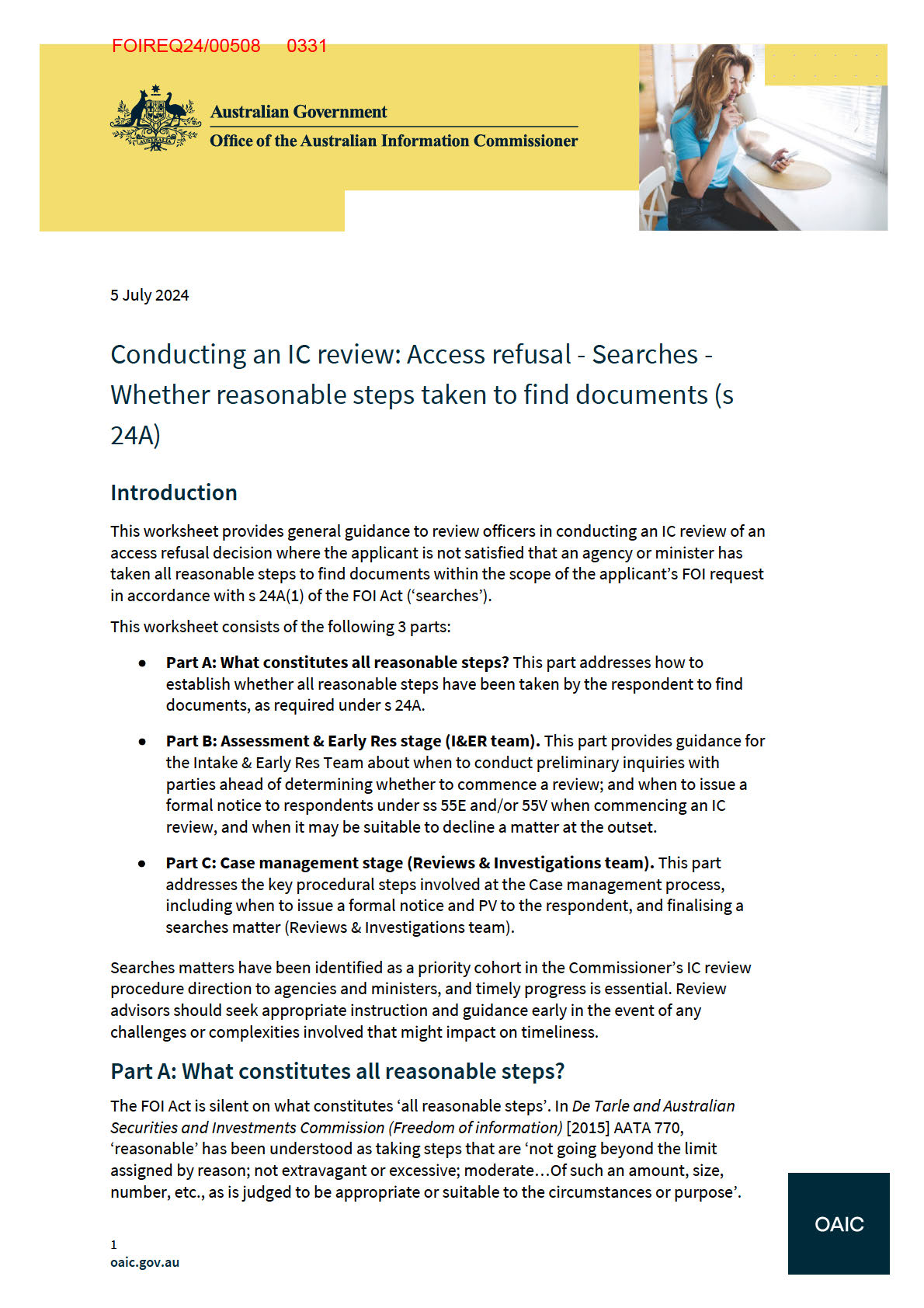
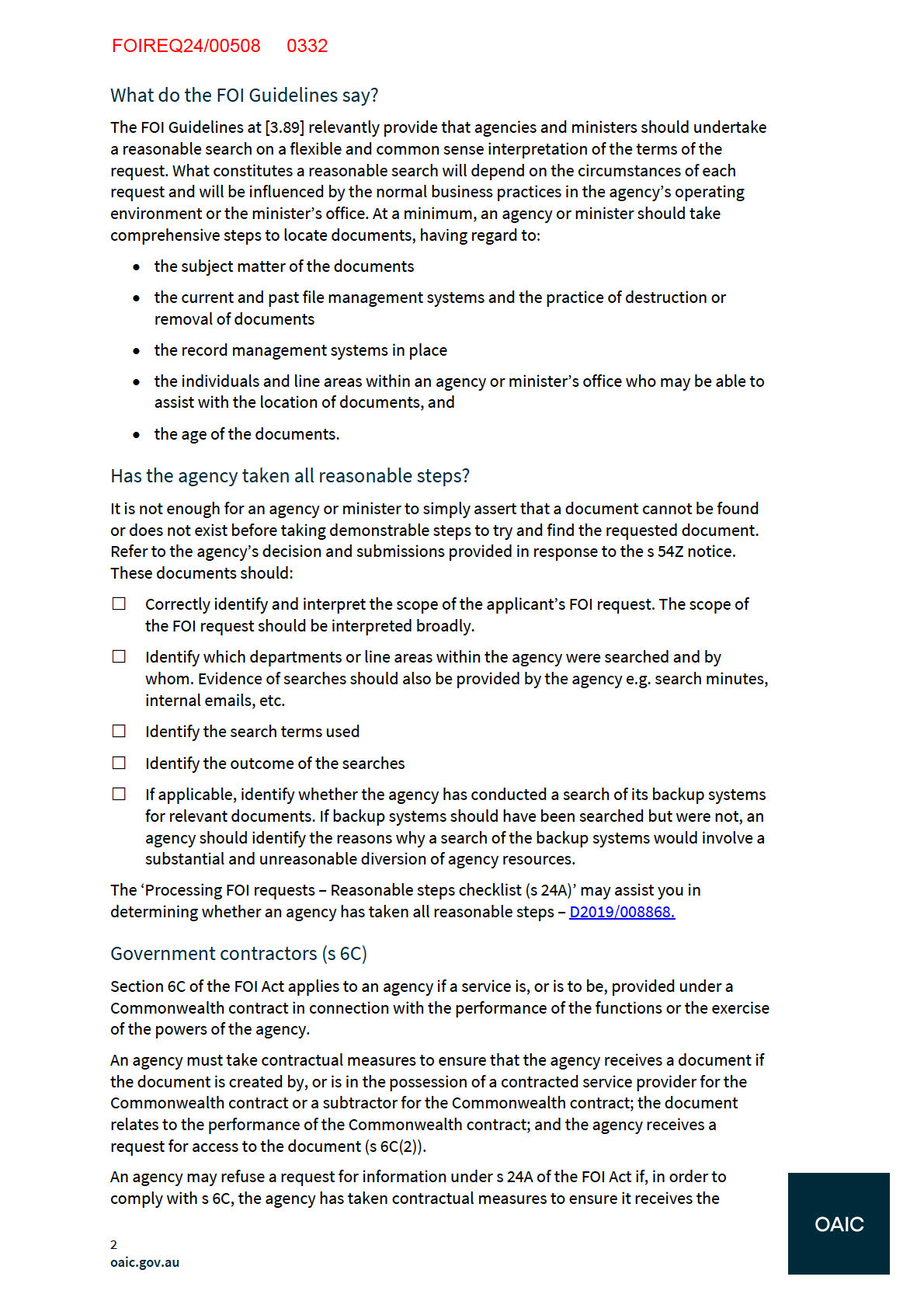
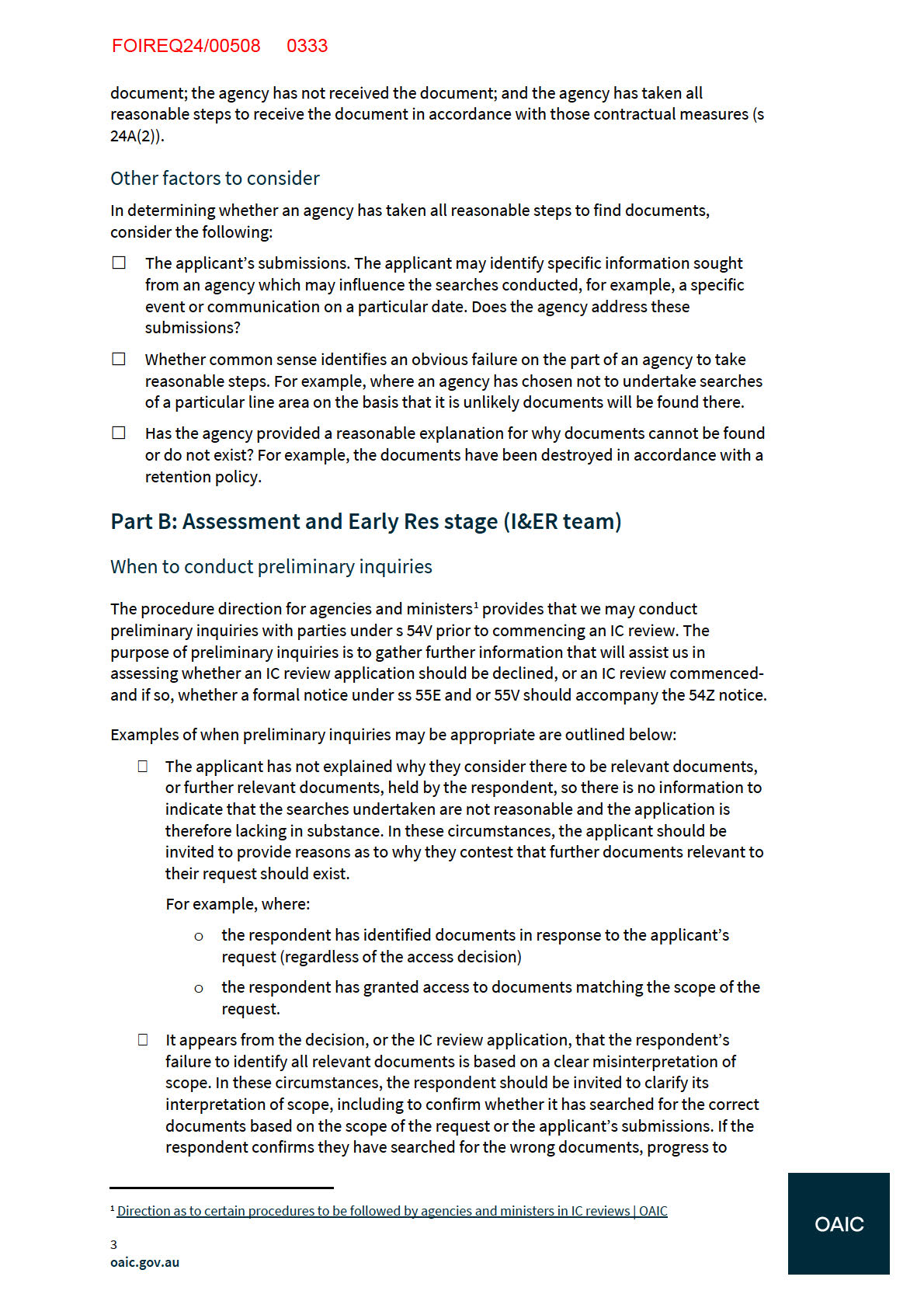
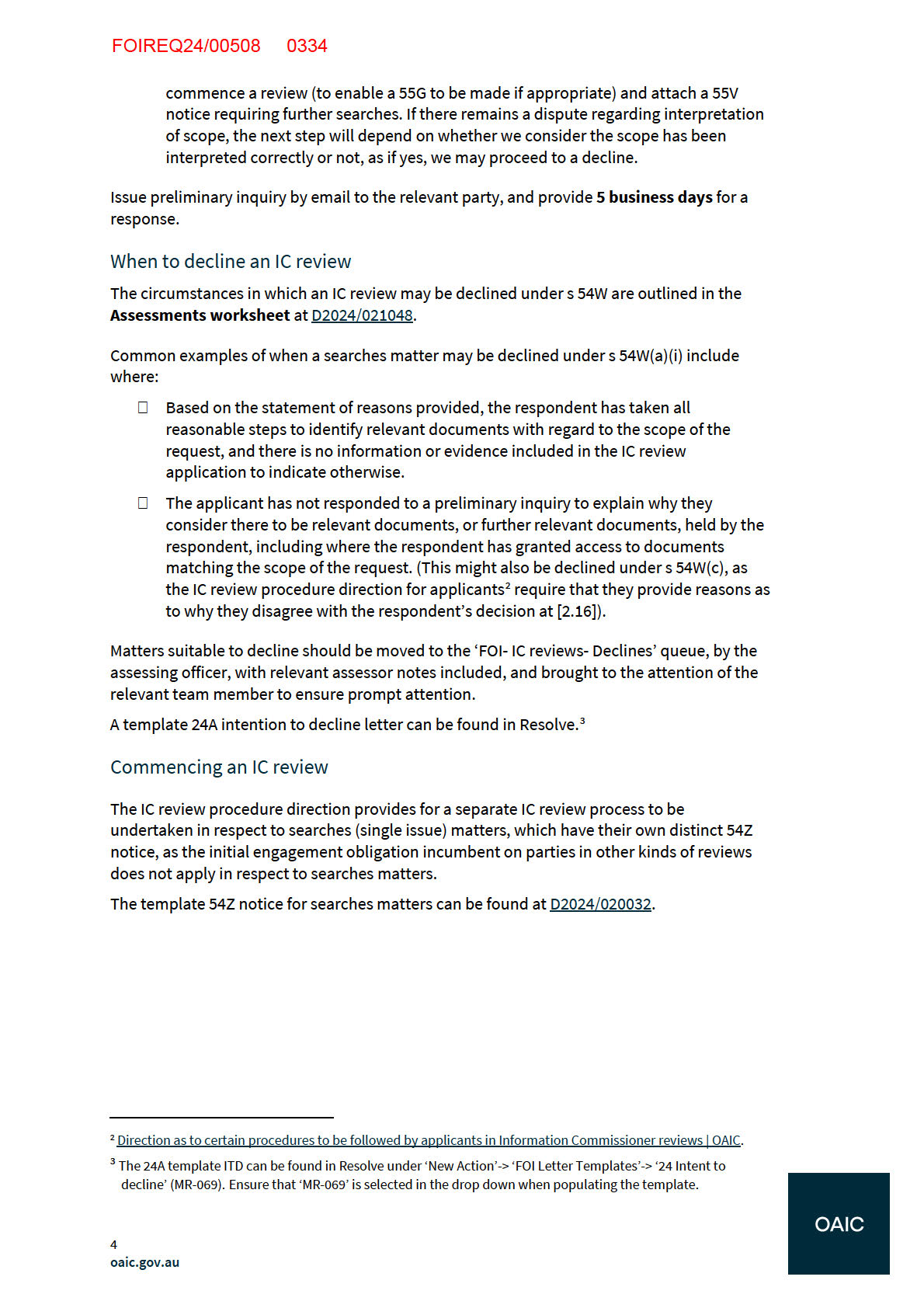
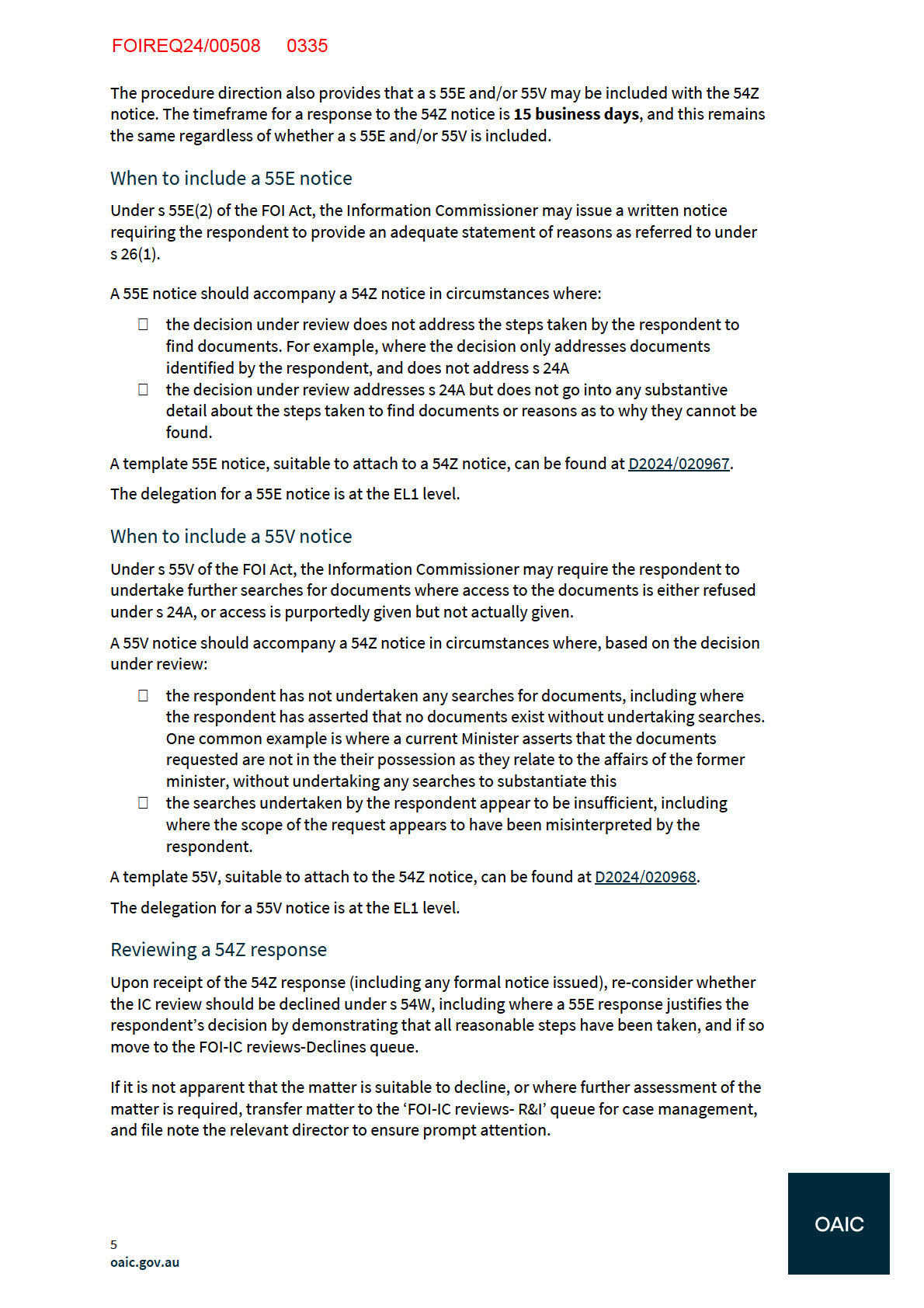
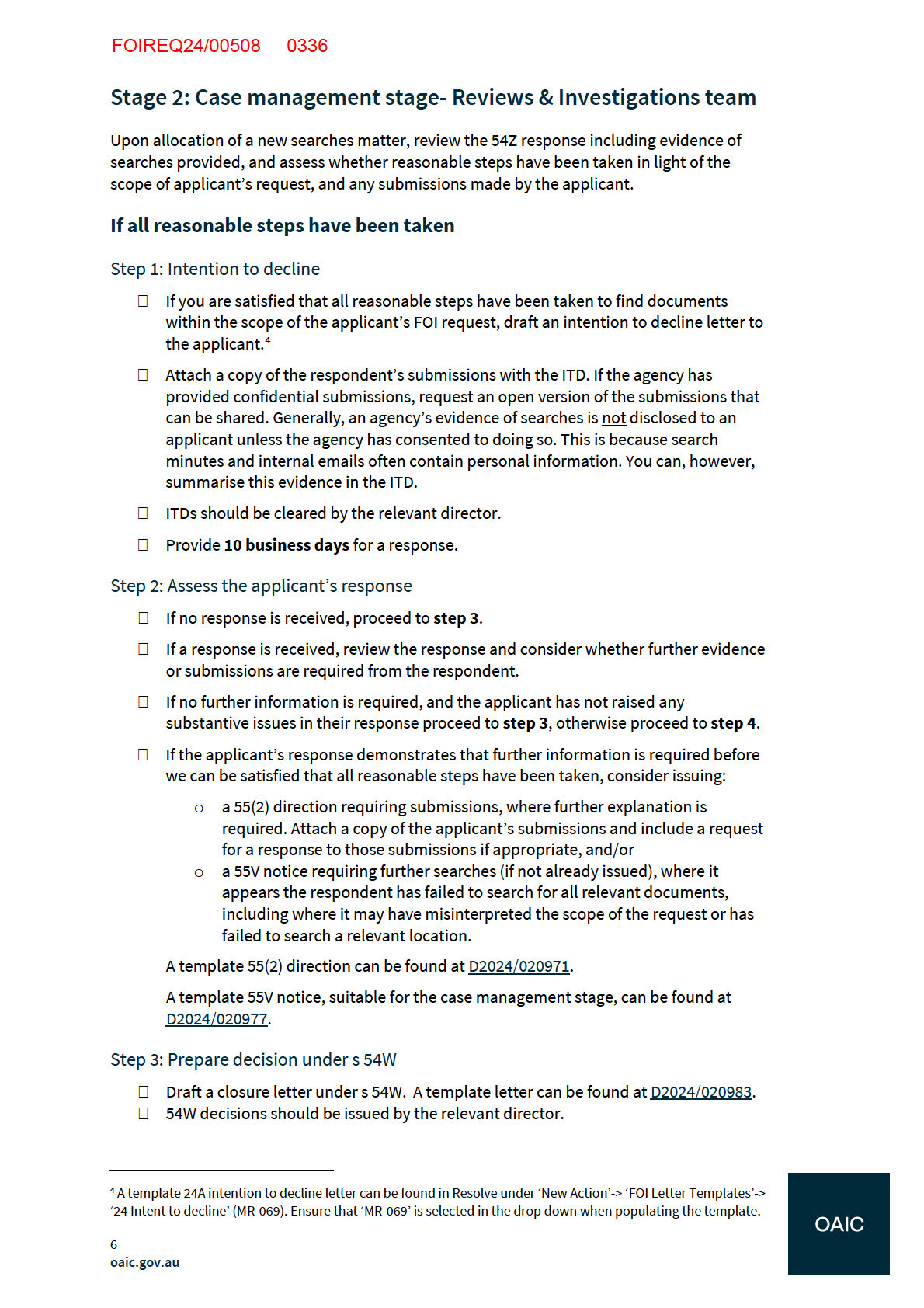
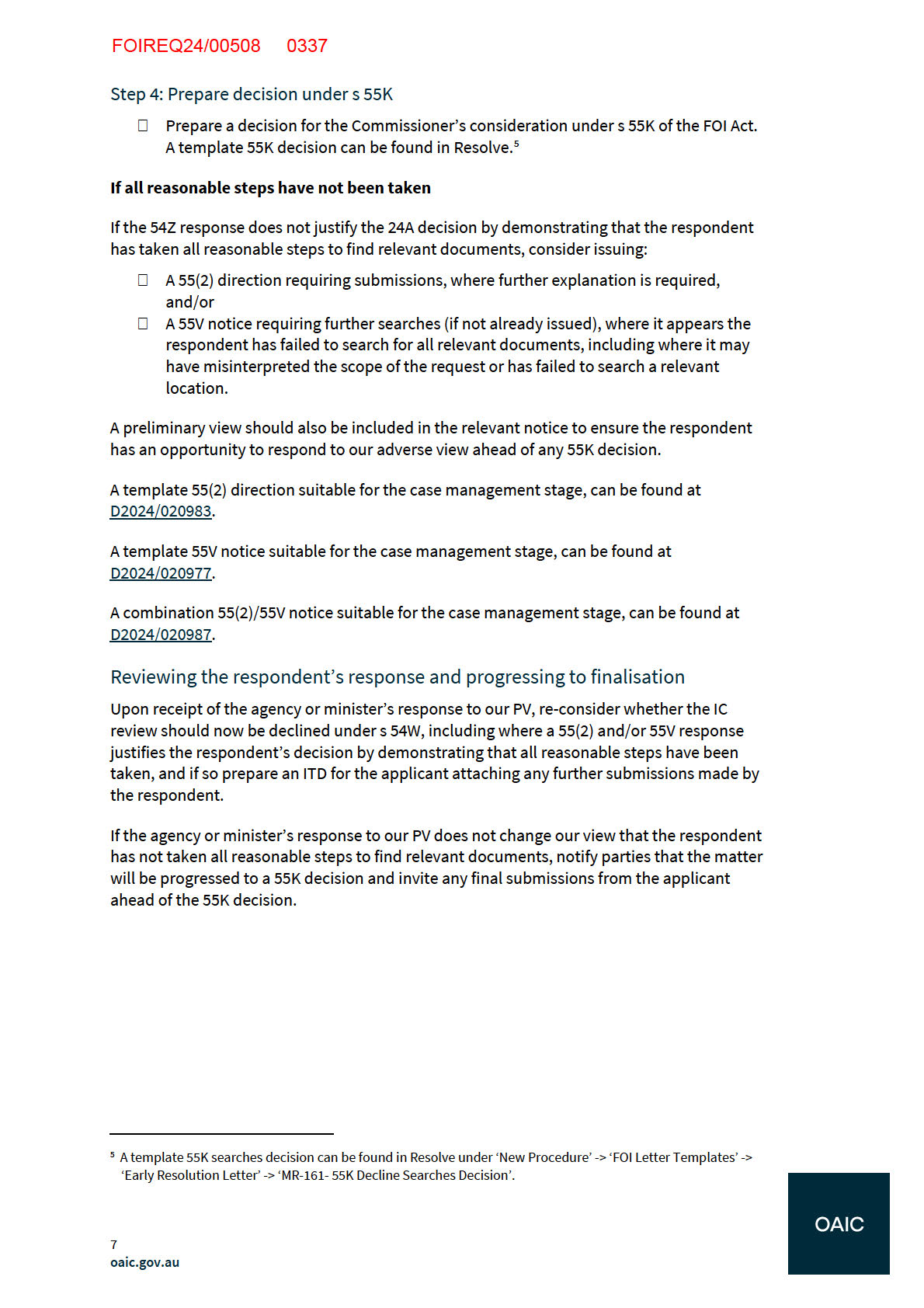







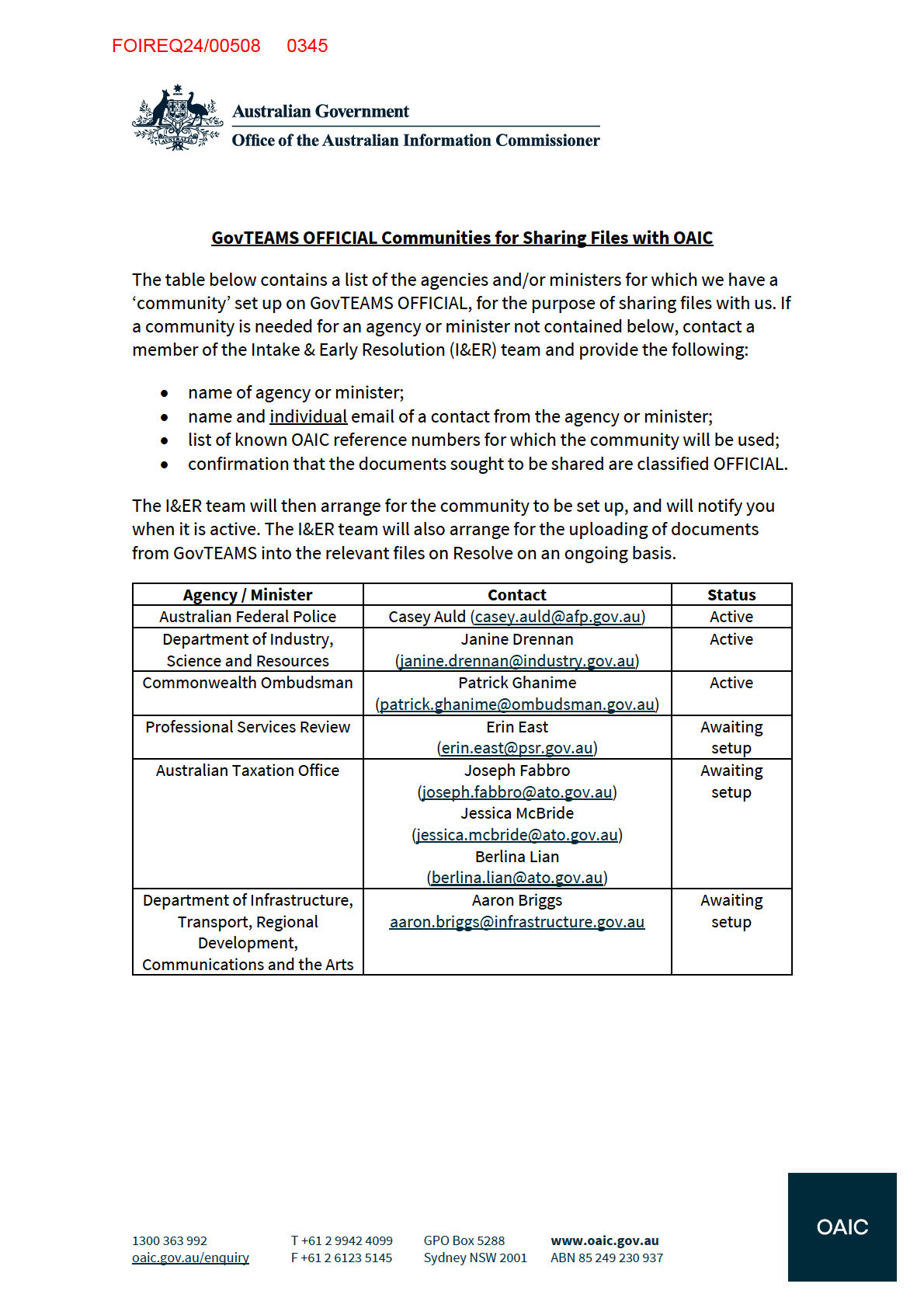
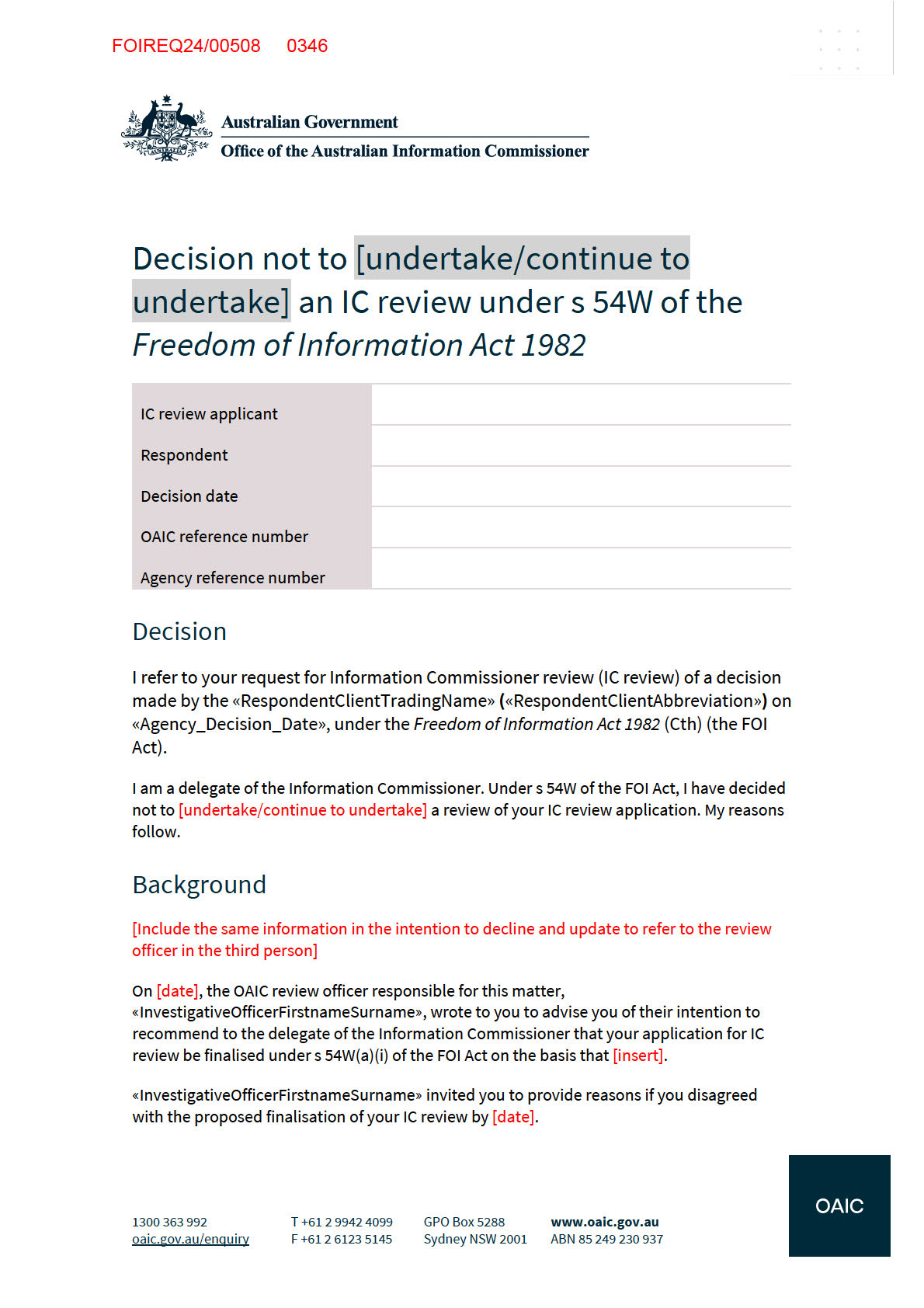
FOIREQ24/00508 0347
[if relevant] Based on the information before me, the OAIC has not received a response.
OR [insert details of response or that no response was received]
Scope of IC review
The issues in this IC review are [insert wording from intention to decline letter].
In making a decision about whether to finalise this matter under s 54W(a)(i), I have had
regard to the following [insert wording from intention to decline letter and any other
relevant information].
[use heading to introduce discussion about the issues in
the IC review]
[insert discussion from the intention to decline letter]
[discuss any submissions received in response to the intention to decline letter]
Decision not to [undertake/continue to undertake] a review
I am a delegate of the Information Commissioner.
Under s 54W of the FOI Act, the Information Commissioner may decide not to undertake a
review, or not to continue to undertake a review, if the Information Commissioner is satisfied
that the IC review application is frivolous, vexatious, misconceived, lacking in substance or
not made in good faith.
I have had regard to:
• the «RespondentClientAbbreviation»'s decision and reasons for decision
• [if relevant insert details of internal review decision / revised decision]
• [if relevant] an unedited copy of the documents identified as falling within the scope of
the request
• the FOI Act, in particular [insert section/s]
• the Guidelines issued by the Australian Information Commissioner under s 93A of the FOI
Act to which agencies must have regard in performing a function or exercising a power
under the FOI Act (FOI Guidelines), in particular paragraphs [insert]
• [if relevant] relevant case law, in particular [insert], and
• the parties' submissions.
2
FOIREQ24/00508 0348
[Set out summary of reasons for findings as set out in intention to decline letter and
consideration of any submissions received in response to intention to decline letter].
On this basis, I am satisfied that the matter is [frivolous, vexatious, misconceived, lacking in
substance, or not made in good faith].
In deciding whether to exercise the discretion not to [undertake/continue to undertake] a
review, I have considered:
• Based on the information me, including the documents at issue, the
«RespondentClientAbbreviation»’s submissions, and relevant case law, I consider
that the «RespondentClientAbbreviation» has discharged its onus of establishing
that the decision is justified.
• [The OAIC did not receive any submissions/response from you @]
• Reviewing/continuing to review this matter will not promote the objects of the FOI
Act.
For these reasons, as a delegate of the Information Commissioner, I have decided to exercise
my discretion to decide not to [undertake / continue to undertake] a review of your
application under s 54W of the FOI Act. I confirm that this IC review is now closed. Your
review rights are set out below.
If you have any questions about this email, please contact
«InvestigativeOfficerFirstnameSurname» on «InvestigativeOfficerPhoneBH» or by email
«InvestigativeOfficerEMail». In all correspondence please include OAIC reference
«CaseNumber».
Yours sincerely
[First Name Last Name]
Director
Freedom of Information
4 November 2024
Review rights
Judicial review
You can apply to the Federal Court of Australia or the Federal Circuit Court for a review of a
decision of the Information Commissioner if you think that a decision by the Information
Commissioner not to review or not to continue to undertake review of your IC review
application under the
Freedom of Information Act 1982 (the FOI Act) is not legally correct. You
can make this application under the
Administrative Decisions (Judicial Review) Act 1977.
3
FOIREQ24/00508 0349
The Court wil not review the merits of your case but it may refer the matter back to the
Information Commissioner for further consideration if it finds the decision was wrong in law
or the Information Commissioner's powers were not exercised properly. An application for
review must be made to the Court within 28 days of the OAIC sending the decision or
determination to you. You may wish to seek legal advice as the process can involve fees and
costs. Please contact the Federal Court registry in your state or territory for more
information, or visit the Federal Court website at http://www.fedcourt.gov.au/.
Making a complaint to the Commonwealth Ombudsman
If you believe you have been treated unfairly by the OAIC, you can make a complaint to the
Commonwealth Ombudsman (the Ombudsman). The Ombudsman's services are free. The
Ombudsman can investigate complaints about the administrative actions of Australian
Government agencies to see if you have been treated unfairly.
If the Ombudsman finds your complaint is justified, the Ombudsman can recommend that
the OAIC reconsider or change its action or decision or take any other action that the
Ombudsman considers is appropriate. You can contact the Ombudsman's office for more
information on 1300 362 072 or visit the Commonwealth Ombudsman’s website at
http://www.ombudsman.gov.au.
Accessing your information
If you would like access to the information that we hold about you, please contact
xxxxx@xxxx.xxx.xx. More information is available on the
Access our information2 page on
our website.
4
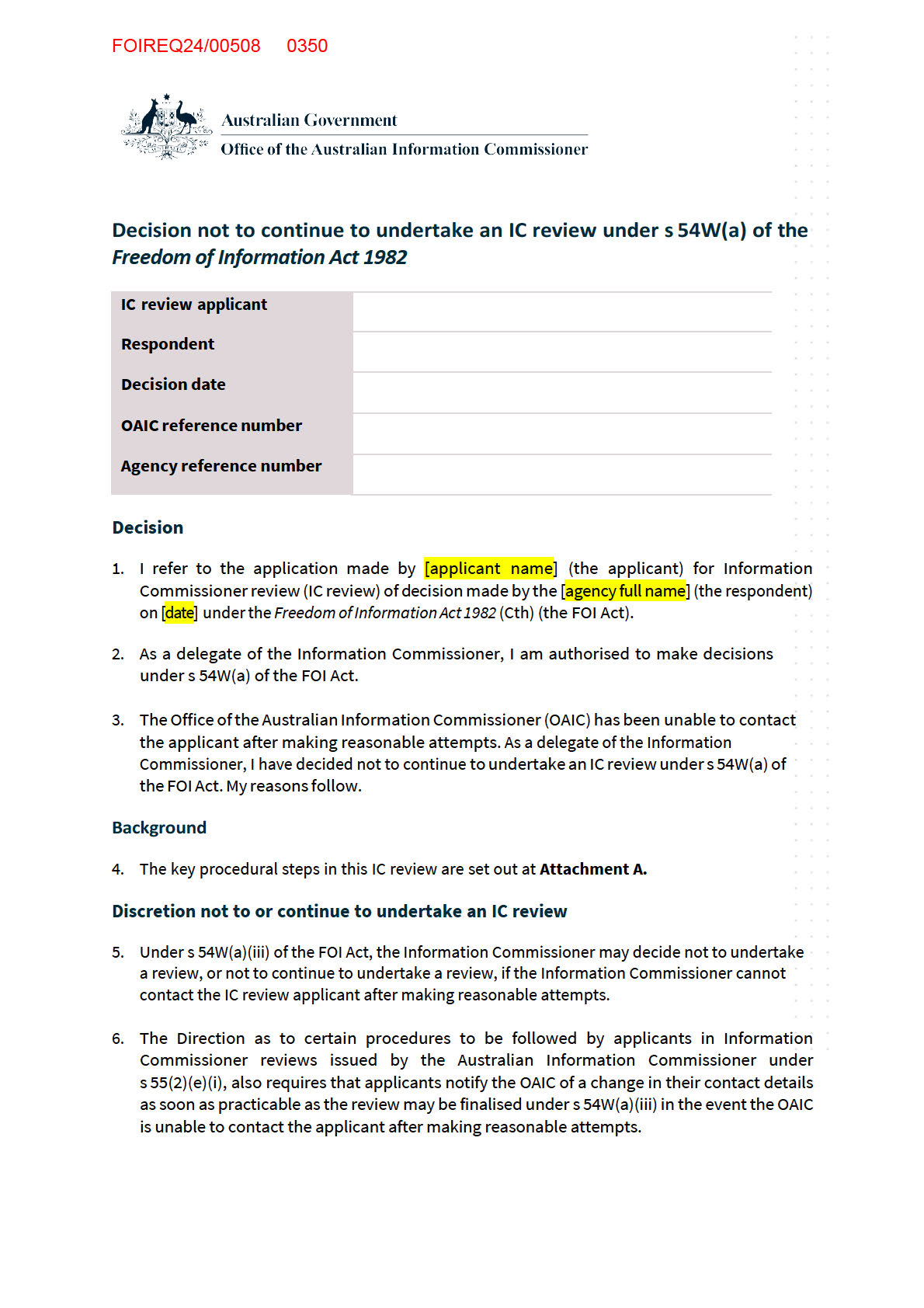
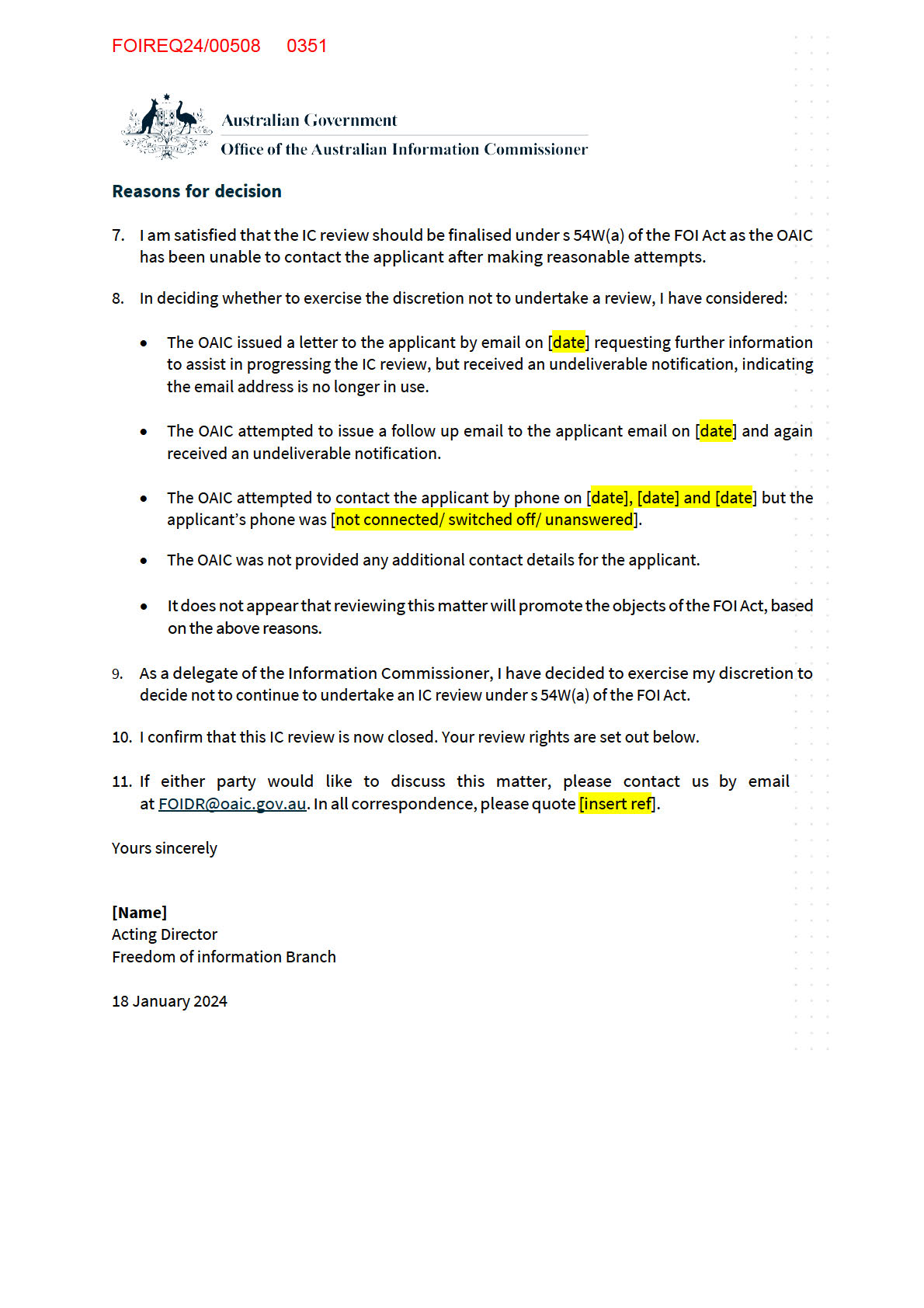
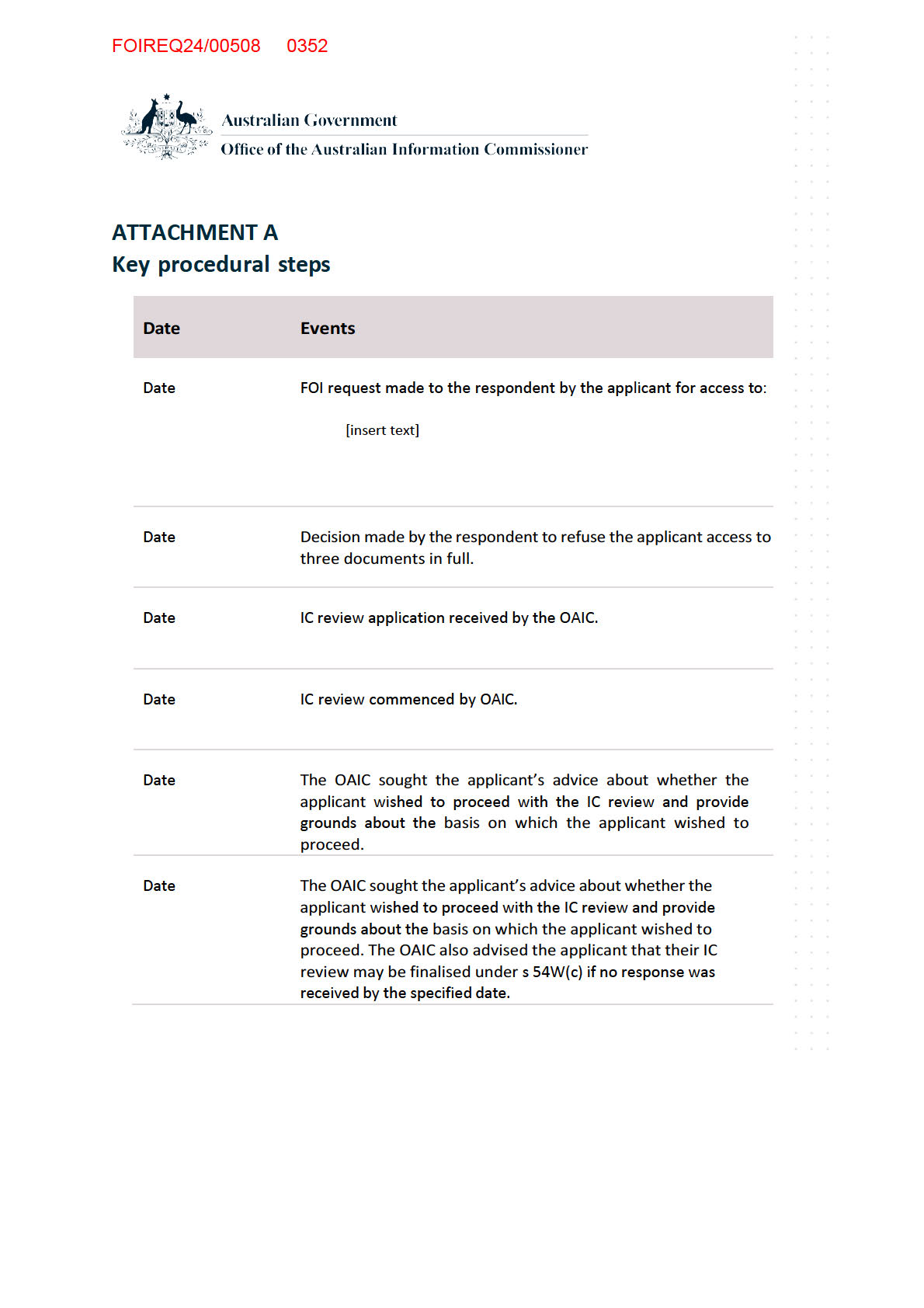


FOIREQ24/00508 0353
Review rights
Judicial review
You can apply to the Federal Court of Australia or the Federal Circuit Court for a review of a decision
of the Information Commissioner if you think that a decision by the Information Commissioner not
to review or not to continue to undertake review of this IC review application under the Freedom of
Information Act 1982 (the FOI Act) is not legally correct. You can make this application under the
Administrative Decisions (Judicial Review) Act 1977.
The Court wil not review the merits of your case but it may refer the matter back to the Information
Commissioner for further consideration if it finds the decision was wrong in law or the Information
Commissioner's powers were not exercised properly.
An application for review must be made to the Court within 28 days of the OAIC sending the decision
or determination to you. You may wish to seek legal advice as the process can involve fees and costs.
Please contact the Federal Court registry in your state or territory for more information, or visit the
Federal Court website at http://www.fedcourt.gov.au/.
Making a complaint to the Commonwealth Ombudsman
If you believe you have been treated unfairly by the OAIC, you can make a complaint to the
Commonwealth Ombudsman (the Ombudsman). The Ombudsman's services are free. The
Ombudsman can investigate complaints about the administrative actions of Australian
Government agencies to see if you have been treated unfairly.
If the Ombudsman finds your complaint is justified, the Ombudsman can recommend that the OAIC
reconsider or change its action or decision or take any other action that the Ombudsman considers is
appropriate. You can contact the Ombudsman's office for more information on 1300 362 072 or visit
the Commonwealth Ombudsman’s website at http://www.ombudsman.gov.au.
Accessing your information
If you would like access to the information that we hold about you, please contact
xxxxx@xxxx.xxx.xx. More information is available on the Access our information1 page on our
website.
1 www.oaic.gov.au/about-us/access-our-information/.
FOIREQ24/00508 0354
Our reference: [insert ref]
Your reference: [insert ref]
FOI Contact Officer
[Agency name]
By email: [Agency email]
Dear FOI Contact Officer
I refer to the application made by Applicant name (the applicant) for Information Commissioner
review (IC review) of the decision made by the [Agency full name] (the Department) on [date].
The applicant has requested that the Commissioner exercise their discretion not to undertake
the review under s 54W(b) of the FOI Act in order to allow the AAT to undertake the review.
A copy of this request is attached.
The Department now has an opportunity to comment on the applicant’s request for an AAT
referral, before a decision is made on this request.
Discretion under s 54W(b) of the FOI Act
Under s 54W(b), the Information Commissioner may decide not to undertake a review, or not to
continue to undertake a review, if the Information Commissioner is satisfied that the interests of
the administration of the FOI Act make it desirable that the IC reviewable decision be
considered by the AAT.
The effect of such a decision would be to finalise this IC review application and allow the
applicant to apply directly to the AAT. They would then have 28 days to lodge an application with
the AAT in accordance with ordinary AAT processes.
The discretion under s 54W(b) of the FOI Act may be exercised where the Information
Commissioner is satisfied that the interests of the administration of the FOI Act make it
desirable that the IC reviewable decision be considered directly by the AAT, rather than by the
Information Commissioner first.
This is also referred to in the Guidelines issued by the Australian Information Commissioner
under s 93A (FOI Guidelines) at [10.88] – [10.89], which states:
The Information Commissioner can decline to undertake a review if satisfied ‘that the interests
of the administration of the [FOI] Act make it desirable’ that the AAT consider the review
application (s 54W(b)). It is intended that the Commissioner will resolve most applications.
Circumstances in which the Commissioner may decide that it is desirable for the AAT to
consider a matter instead of the Commissioner continuing with the IC review include:
• where the IC review is linked to ongoing proceedings before the AAT or a court
• where there is an apparent inconsistency between earlier IC review decisions
and AAT decisions
FOIREQ24/00508 0355
• where, should the application progress to an IC review decision, the IC review
decision is likely to be taken on appeal to the AAT on a disputed issue of fact
• where the FOI request under review is of a level of complexity that would be
more appropriately handled through the procedures of the AAT
• where there may be a perceived or actual conflict of interest in the
Commissioner undertaking review, including where:
o the FOI request under review was made to, or decided by, the
Information Commissioner or their delegate
o the FOI request or material at issue relate to specific functions exercised
by the Information Commissioner under the Privacy Act
o the applicant has active matters in other forums, including the AAT or
Federal Court and the Information Commissioner is the respondent
• where consideration by the AAT would further the objects of the FOI Act,
particularly in relation to the performance and exercise of functions and powers
given by the FOI Act to facilitate and promote public access to information,
promptly and at the lowest reasonable cost (s 3(4)).
The OAIC will consult the parties involved in a matter before making a decision under s 54W(b)
to conclude an IC review.
The circumstances in which the Information Commissioner may consider it desirable that the
AAT consider the review application, as outlined in the FOI Guidelines above, are not exhaustive.
There wil be circumstances that are not listed where the Information Commissioner may deem
it desirable to refer the matter to the AAT.
As outlined in the attached correspondence, [insert reasons]. Given this, I intend to recommend
that the Commissioner exercise their discretion under s 54W(b) of the FOI Act not to undertake
this IC review.
Next steps
To assist in considering whether the application should be finalised under s 54W(b) of the FOI
Act, please provide the Department’s views by no later than [
two weeks].
After this date, I wil proceed with my recommendation to the Commissioner based on the
available information.
Should you have any questions about this matter in the interim, please contact me directly.
Kind regards
FOIREQ24/00508 0356
Our reference: **
Agency reference: **
Mr/Ms Applicant
By email: **
Your IC review application about the agency
Dear Mr/Ms A
I refer to your application for IC review of a decision made by the agency (the agency) on [date].
On date, the agency notified the Office of the Australian Information Commissioner (the OAIC) it
had made a revised decision to give you full access to the document you requested/give you
access to further documents.
Can you please notify us by
2weeks, if you now wish to:
• Withdraw the IC review application, or
• Proceed with the IC review application.
Should you wish to proceed with the IC review application, please provide the following
information by
2weeks:
a. identify the aspect(s) of the agency or Minister’s decision about which the review is sought
b. state why you disagree with the agency or Minister’s decision
c. identify which documents you consider have been wrongly refused or which exemptions
have been incorrectly applied
d. [only include if relevant- otherwise delete] if the request has been refused on the grounds
that it would substantially or unreasonably divert an agency’s resources or interfere with
the performance of a minister’s functions (ss 24 and 24AA) – specify the reasons why you
believe the FOI request would not have this impact.
Intention to decline to continue IC review
Please note that the Commissioner’s written direction to IC review applicants provides that:
• applicants who are not satisfied with the revised decision must explain why they disagree
with the revised decision and the basis on which they wish to proceed with the IC review. If
the applicant does not respond to the OAIC’s correspondence, the Information
Commissioner may decide not to continue to undertake the IC review (s 54W of the FOI Act)
[2.25], and
• applicants
must respond to enquiries from the OAIC within the period provided unless
there are circumstances warranting a longer period to respond [2.22].
FOIREQ24/00508 0357
Section 54W(c) of the FOI Act provides that the Information Commissioner may decide not to
undertake, or continue to undertake, an IC review where an applicant fails to comply with a
direction of the Information Commissioner.
Should we not receive a response from you to this email by
2weeks, your IC review application will
be finalised by a delegate of the Information Commissioner under s 54W(c).
If you have any questions regarding this email please contact us via email at xxxxx@xxxx.xxx.xx.
Please quote the OAIC reference number at the top of this email in all correspondence.
Sincerely
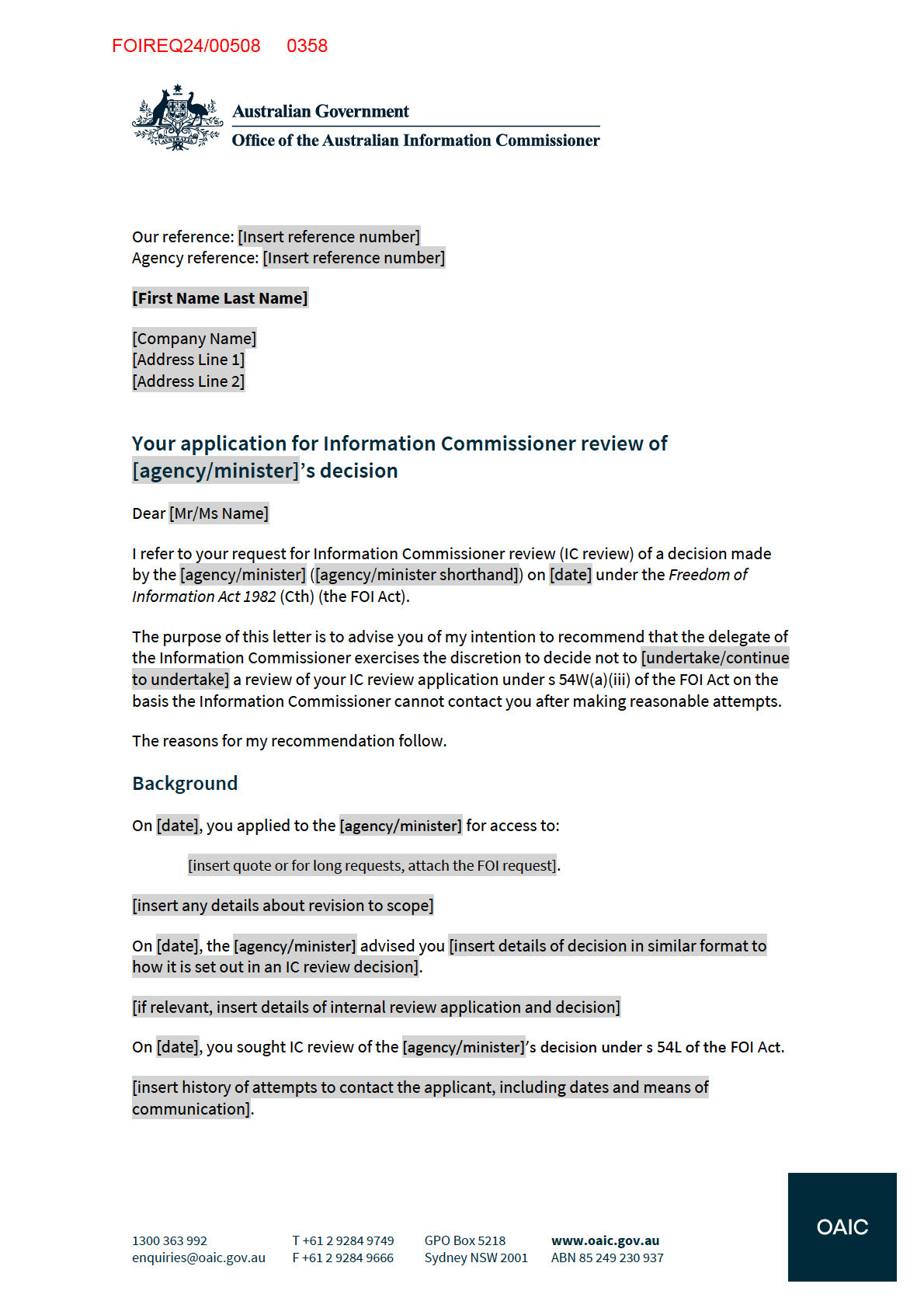
FOIREQ24/00508 0359
Discretion not to [undertake/continue to undertake] an IC review
Under s 54W of the FOI Act, the Information Commissioner may decide not to undertake a
review, or not to continue to undertake a review, if the Information Commissioner cannot
contact the IC review applicant after making reasonable attempts.
As discussed above, I have attempted to contact you using the contact details you provided
on your IC review application form [and insert other details if relevant] and I have been
unable to contact you.
I therefore intend to recommend to the delegate of the Information Commissioner that they
exercise the discretion not to [undertake/continue to undertake] a review of this IC review
application under s 54W(a)(ii ) of the FOI Act unless you contact me by
[@ 2 weeks].
If I do not hear from you by this date your IC review will be finalised under s 54W and you will
be notified of your review rights.
I can be contacted on (02) [xxxx] [xxxx] or on [name]@oaic.gov.au. In all correspondence
please quote [OAIC reference number].
Yours sincerely
[First Name Last Name]
[Position Title]
[date]
2
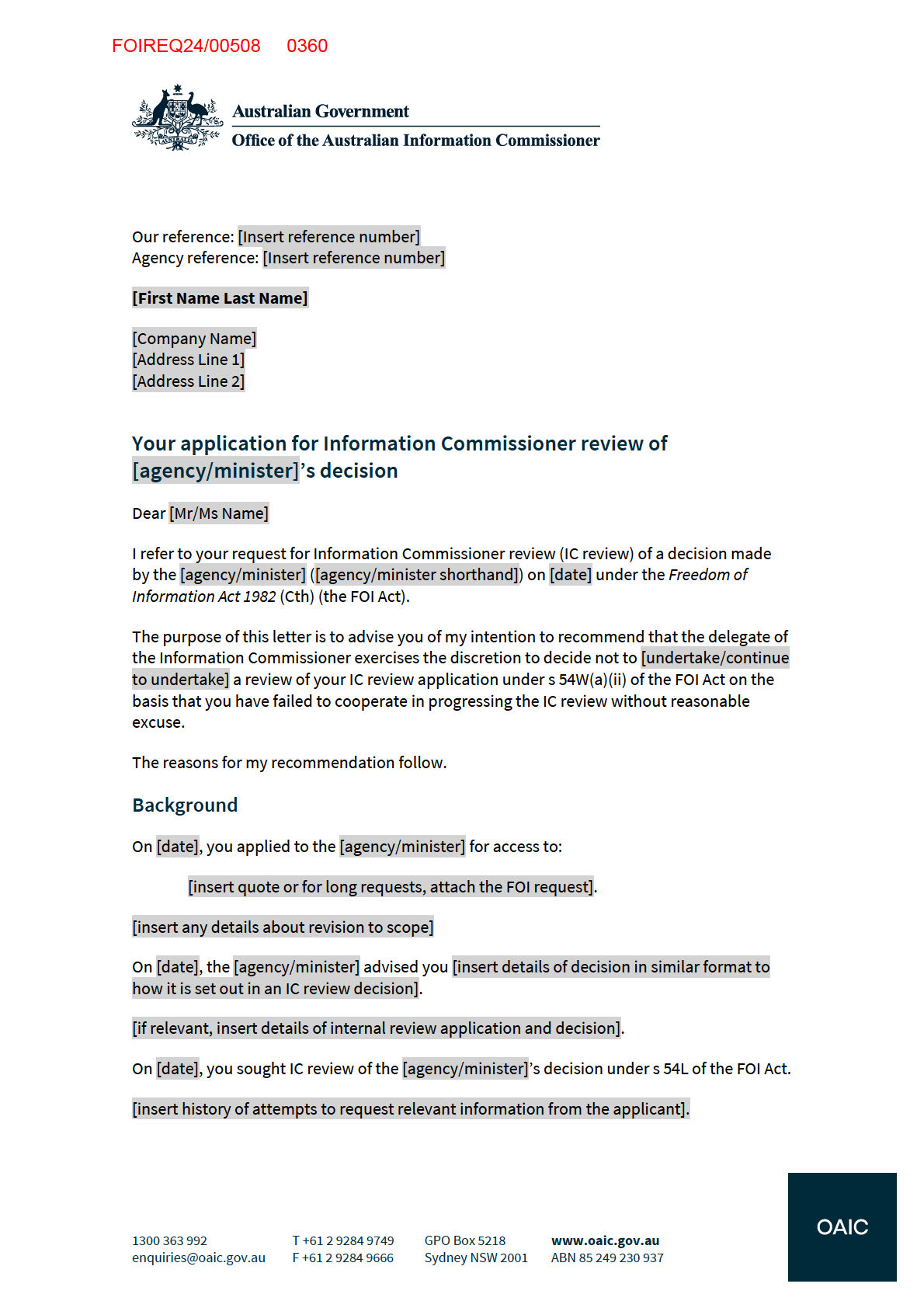
FOIREQ24/00508 0361
Discretion not to [undertake/continue to undertake] an IC review
Under s 54W(a)(i ) of the FOI Act, the Information Commissioner may decide not to
undertake a review, or not to continue to undertake a review, if the IC review applicant has
failed to cooperate in progressing the IC review without reasonable excuse.
As discussed above, I have attempted to obtain relevant information from you in order to
enable the IC review to be progressed [insert specific details as relevant] however I have not
received the required information from you by the specified date/ /or you have indicated
that you will not be providing the requested information [update as appropriate and explain
relevance of information required including why the review cannot be progressed without
it].
I therefore intend to recommend to the delegate of the Information Commissioner that they
exercise the discretion not to [undertake/continue to undertake] a review of this IC review
application under s 54W(a)(ii) of the FOI Act unless you provide the requested information
by
[@ 2 weeks].
If I do not hear from you by this date your IC review will be finalised under s 54W(a)(i ) and
you will be notified of your review rights.
I can be contacted on (02) [xxxx] [xxxx] or on [name]@oaic.gov.au. In all correspondence
please quote [OAIC reference number].
Yours sincerely
[First Name Last Name]
[Position Title]
[date]
2
